Springboks
Sports Minister wants Nick & Naas suspended
Supersport is investigating Ashwin Willemse’s on air walk out in protest against fellow rugby analysts Nick Mallett and Naas Botha, but in the interim the Minister of Sport and Recreation Tokozile Xasa wants the veteran SuperSport duo suspended.
Willemse accused Mallett and Botha of patronising him because of his skin colour.
The Sports Minister, in a statement to the media, said:
“This behaviour of entitlement by some white South Africans who continue to think that their whiteness represent better must come to an end, if it was not for a barbaric nonsensical apartheid system that privileged them we could not have implemented quota system to normalize an otherwise abnormal system.
“Willemse is not just a former Springbok player but in 2003 he was named SA Rugby Player of the Year, Young Player of the Year and the Player’s Player of the Year. Players like Willemse, (Bryan) Habana and (Siya) Kolisi continue to make us proud as a nation and affirm that they are not token players or quota players.
“The department of Sport & Recreation through its transformation charter that was adopted in 2011 noted that quota system has been largely unsuccessful in bringing about an effectively transformed sport system and is causing substantial consequential damage for many black players who were labelled as ‘tokens’, and referred to as mere replacement of white face with a black face.
“It is clear that Ashwin Willemse was referred as a quota player by his fellow panelists despite his many successes in the field of play, I call upon SuperSport to suspend the two panelists while they are busy with full investigation.
The continued appearance of Mallett and Botha will be seen as an endorsement of their alleged racist behaviour.”

Willemse, before his walk out, confronted Mallett and Botha and said: “I’ve been in the game for a long time like most of us here. As a player, I’ve been called a quota for a long time and I’ve worked very hard to earn the respect I have now. I’m not going to sit here and be patronised by these two individuals (Mallett and Botha) who played their rugby during the apartheid era, a segregated era.”
Willemse went on to say he “can’t work with people who undermine other people” and that he was “glad it happened on live TV so that people can see”.
Willemse played for the Springboks between 2003 and 2007 and was a member of the 2007 World Cup winning squad.
International Rugby
World reaction: Boks turn Cardiff into a crime scene
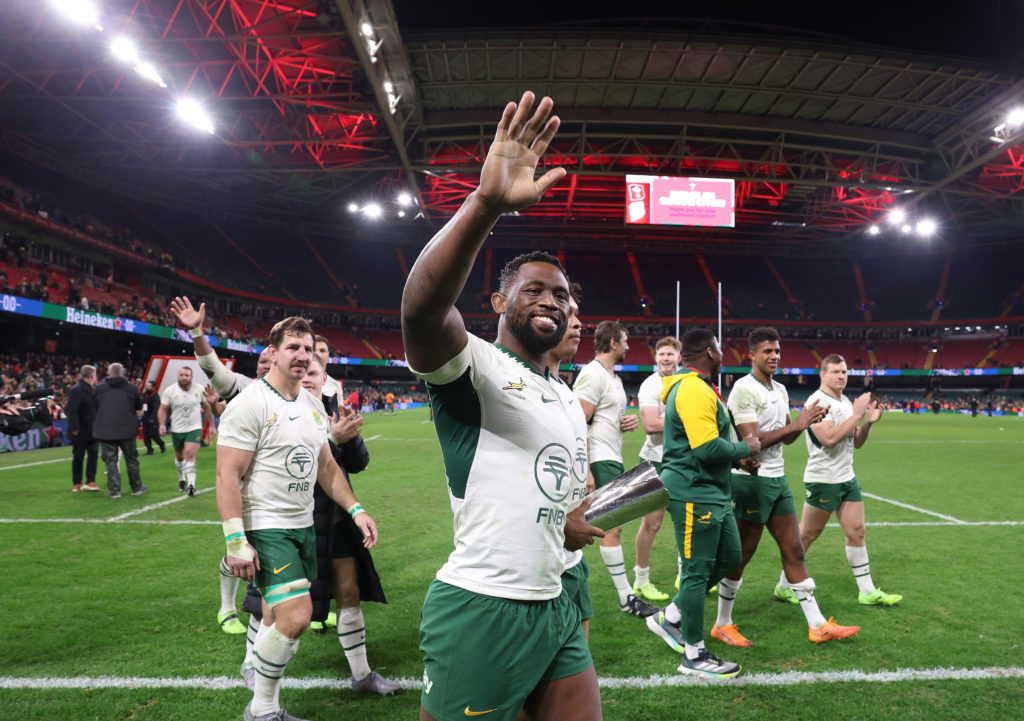
The global rugby press reaction to the Springboks 73-0 slaughter of Wales in Cardiff was split three ways: awe at the Boks, horror at Wales, and anger at the red-carded Eben Etzebeth.
The global rugby media didn’t so much report on South Africa’s 73–0 demolition of Wales as conduct a post-mortem.
Eleven tries, a clean sheet and a performance dripping with menace left the Welsh press stunned, the English papers grim, and the New Zealanders nodding with familiar respect. For the Springboks, it was another ruthless reminder of the standard they set.
For Wales, it was a national reckoning.
WalesOnline labelled it the “darkest day in Welsh rugby”, a humiliation years in the making. Their writers spoke of sadness and inevitability as a proud Test nation was “pulverised” in its own cathedral.
The Times questioned whether “men against boys” even captured the mismatch, praising South Africa’s precision while condemning Eben Etzebeth’s moment of madness as the only stain on an otherwise brutal masterclass.
The Sunday Telegraph called Wales “pointless” in every sense: a non-contest, a miscalculated fixture, and a record defeat that exposed the gulf in class.
The Rugby Paper described an “avoidable mismatch” that taught Wales nothing about their future and reinforced everything about South Africa’s relentlessness.
From a South African lens, the tone was clinical rather than triumphant.
SA Rugby Magazine, TimesLIVE and Keo.co.za all stressed that this was the full stop on an unbeaten tour and another data point in Rassie Erasmus’s expanding blueprint. Fringe players flourished, structure and brutality blended seamlessly, and the trademark refusal to concede even a consolation point in the 80th minute said more about this team’s identity than the scoreline.
Even in New Zealand, the reaction was clear: NZ Herald credited a “superpower doing superpower things” and noted that South Africa end the year not only as world champions, but as the sport’s pace-setters.
The world didn’t just witness a hiding. It witnessed a statement.
South Africa’s standards are non-negotiable. Their depth is frightening.
And Wales – under-strength, underpowered and overwhelmed.
KEO & ZELS – SIYA’S BOKS PURR WITH PERFECTION
WalesOnline – “Welsh team crumble in record home defeat”
WalesOnline’s match coverage framed this as the darkest day in Welsh rugby at the Principality: 11 unanswered tries, first time “nilled” at home in decades, and a scoreboard that felt like an execution rather than a contest. Their pieces stressed how under-strength Wales were, but made it clear that selection politics and WRU mismanagement created the circumstances for this humiliation. The tone mixed shock and resignation – the sense that this 73-0 was years in the making. Follow-up reaction columns spoke of “very real sadness” and a tragic unravelling of a proud Test nation in front of its own people. Flashscore+1
Welsh Sunday voice – Nation.Cymru / Welsh reaction
As a distinctly Welsh lens outside the big UK dailies, Nation.Cymru’s weekend take treated 73-0 as a national reckoning. The piece stressed that the result wasn’t just about missing Premiership-based players; it was about a structural decay in Welsh rugby – from pathway to finances – exposed brutally by the world champions. The article highlighted a fanbase oscillating between anger and apathy, a stadium with worrying gaps in the stands and a governing body “out of answers”. It argued that the scoreline must force WRU members to confront whether the current model can produce anything other than more days like this. The Independent+1
The Times / Sunday Times (London) – Steve James
In The Times (from the same London stable as the Sunday Times), Steve James called it “every bit as grim as feared”: a physical mismatch that made “men against boys” feel like understatement. He emphasised the Boks’ scrummage and aerial dominance, Sacha Feinberg-Mngomezulu’s 28-point masterclass and Wales’ inability to execute even basic set-piece chances. But his central theme was Etzebeth: the eye-gouge described as a “blatant act of thuggery” that soiled a magnificent team performance and will likely bring a long ban. For Wales, he portrayed a low ebb – empty seats, fragile confidence and shallow depth laid bare. The Times
Sunday Telegraph – James Corrigan
For The Sunday Telegraph, James Corrigan’s live report and follow-up hammered home one idea: “pointless Wales”. His copy stressed how uncompetitive the hosts were from the opening scrum, how quickly South Africa’s power game turned into a procession, and how little value the fixture offered anyone by the final quarter. Corrigan underlined that this was Wales’ worst home defeat and first Cardiff whitewash since the 1960s, and questioned the wisdom of scheduling such a mismatch outside the Test window. He also leaned into the Etzebeth incident, arguing that an 11-try rout did not need to be accompanied by such unnecessary nastiness. Telegraph+1
The Rugby Paper (UK) – weekend broadsheet
The Rugby Paper’s headline – “Steve Tandy’s pointless side put to shame in 11-try thrashing” – captured its harsh verdict. Their report stressed how this was a weakened Wales, stripped of Premiership-based players, but insisted that didn’t excuse the scale of collapse. The analysis described South Africa as operating in a different weight division, with their bench alone out-capping the entire Welsh match-day 23. The paper portrayed the game as a damaging non-contest that taught Wales nothing, eroded public faith and raised serious questions about WRU strategy. The Etzebeth red card was the grim coda to what they saw as a “needless mismatch”. Ground News+1
Planet Rugby – Winners & Losers
Planet Rugby’s “Wales v Springboks Winners & Losers” piece leaned into the contrast: Sacha Feinberg-Mngomezulu, Andre Esterhuizen and the Bok pack among the big winners; Eben Etzebeth and the sport’s image squarely in the losers column. They praised South Africa’s “floor-filling tunes” in attack – the variety of their strike plays and the fluency of a heavily rotated side – and highlighted Esterhuizen as the poster boy of Rassie’s hybrid revolution, this time unleashed as a classic ball-carrying 12. On Wales, the verdict was that an under-powered side were “out of their depth” and that 73-0 will haunt the WRU for years. Planet Rugby+1
Rugby365 – Warren Fortune & Leezil Hendricks
On Rugby365, Warren Fortune’s match report and Leezil Hendricks’ player ratings built a coherent picture: South Africa ended their Nations Series with a “73-0 command performance”, scoring 222 points across the tour and conceding just 51. The site stressed how thoroughly the Boks dominated the collisions and set piece, and how many so-called fringe players enhanced their 2027 World Cup credentials. Follow-up video pieces focused on Rassie Erasmus’ reaction to Etzebeth’s red – Erasmus admitting the card was justified and that “the optics weren’t great”. At the same time, Rugby365 emphasised how ruthlessly the Boks defended their line in the closing minutes to protect the nil. Rugby365+3Rugby365+3Rugby365+3
Keo.co.za – Mark Keohane
On Keo.co.za, your “Andre the Giant & his fellow Boks slay the Dragons” column framed 73-0 as the ultimate expression of Rassie’s “no let-up” mentality. You leaned into the symbolism of the Boks still fighting for a turnover in the 79th minute with the score already at 73-0, arguing that this spoke to the aura and internal standards of this group. The piece highlighted the dominance of the forwards, the impact of Esterhuizen in his new hybrid role, and the statement made by finishing an unbeaten tour with a record win. Etzebeth’s red was acknowledged, but the core theme was character and ruthlessness rather than controversy. KEO.co.za+2KEO.co.za+2
Sunday Times South Africa / TimesLIVE
Within the Sunday Times SA / TimesLIVE stable, coverage underlined the professional coldness of the Bok performance rather than the chaos of the scoreline. The Business Day/Sunday Times reports talked of a “clinical” and “commanding” demolition that completed a clean sweep on tour and cemented South Africa’s No 1 ranking. They emphasised how many combinations Rassie experimented with across Japan, France, Italy, Ireland and Wales, yet still produced an 80-minute performance in Cardiff. The Etzebeth incident was treated as an ugly, isolated flashpoint in an otherwise near-perfect collective exhibition from a side that “simply don’t do dead rubbers”. Business Day+2Sunday Times+2
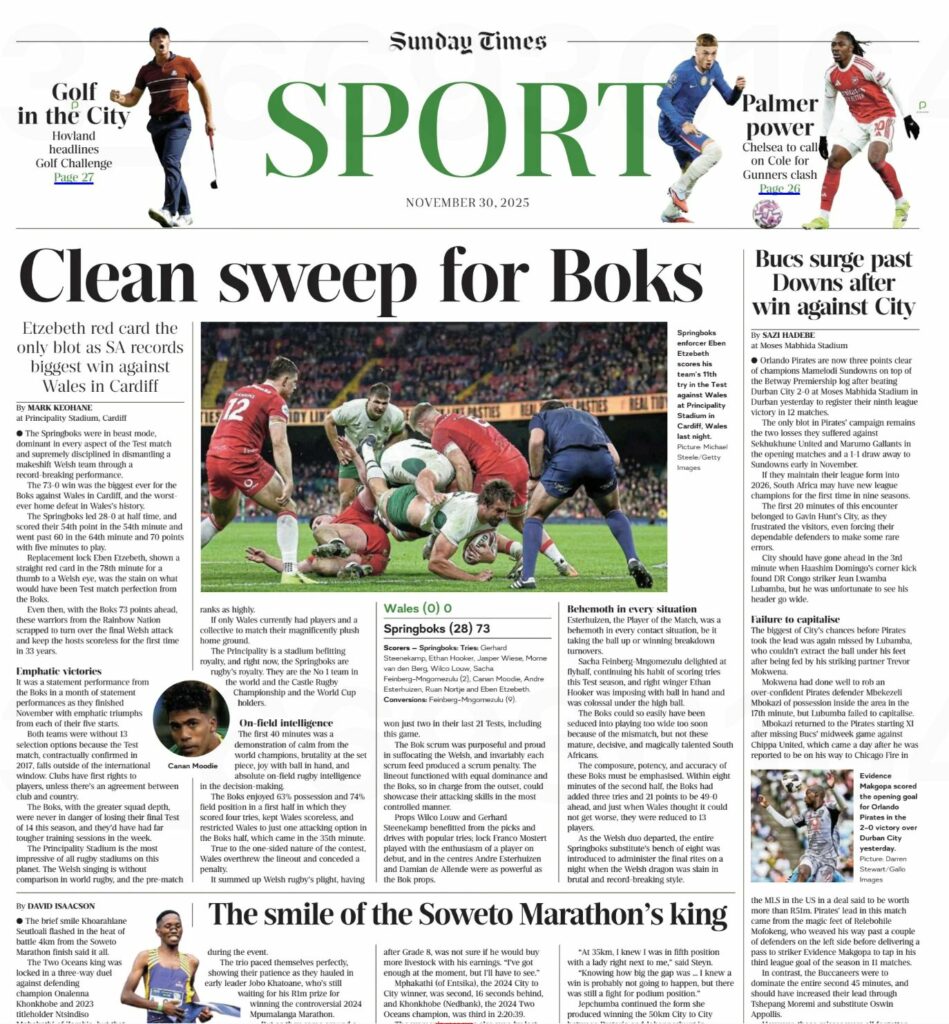
SA Rugby Magazine – Borchardt & co.
SA Rugbymag.co.za ran a suite of pieces: Simon Borchardt’s “Brilliant Boks demolish Dragons” match report, features on Rassie being “proud of hungry Boks”, Siya Kolisi hoping the red card wouldn’t overshadow things, and a big-picture “Springboks gaze down on rugby world”. The mag stressed that 73-0 was one more data point in a two-year stretch of dominance, not a freak outlier. They homed in on the hunger of fringe players, the work-rate in chasing the shut-out and the seamless integration of youngsters like Feinberg-Mngomezulu. The red card was acknowledged but framed as a disciplinary headache rather than a stain on the team. SA Rugby magazine+3SA Rugby magazine+3SA Rugby magazine+3
AFRICA PICKS: CASHING IN ON THE BOKS
NZ Herald – Kiwi view on a Bok juggernaut
The NZ Herald piece (“Springboks crush Wales 73-0 in historic test demolition”) was a wire-style report but with a clear Kiwi subtext: respect for a rival superpower doing superpower things. It highlighted Feinberg-Mngomezulu’s Llandovery College link and 28-point haul, noted that this surpassed England’s 68-14 as Wales’ worst home defeat, and pointed out it was the first time Wales had been held scoreless at home in the professional era. For New Zealand readers, the article placed the rout in the context of South Africa closing 2025 with 12 wins from 14 Tests, reinforcing the sense that the Boks remain the team to beat in world rugby. NZ Herald+1
Planet Rugby, RugbyPass & others
RugbyPass, Guardian live, ESPN, RTE and TNT Sports all reinforced the same themes: “men against boys”, a structural Welsh crisis, a Bok machine that finishes the year indisputably No 1, and a sour taste from Etzebeth’s red. Many pundits, notably Dan Biggar on TNT, questioned whether such mismatches should continue to be scheduled; others argued it showed exactly why South Africa are on a different tier to every northern-hemisphere side right now. TNT Sports+4The Guardian+4ESPN.com+4
*Compiled by Keo.co.za & ChatGPT (All references verified)
KEO News Wire
Andre the Giant & his fellow Boks slay the Dragons
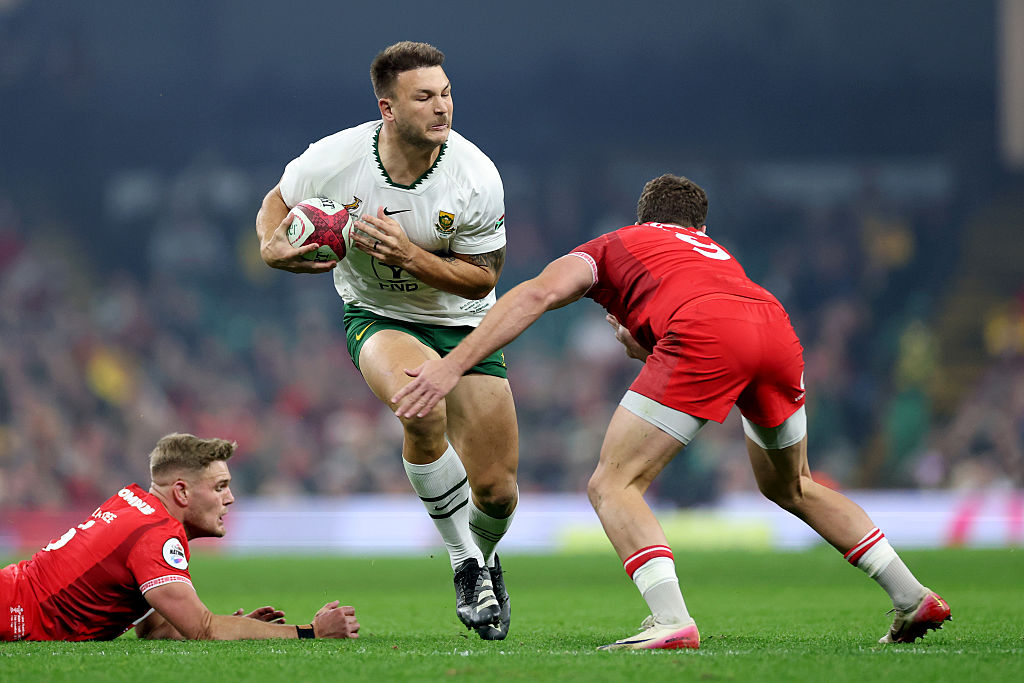
Andre ‘The Giant’ Esterhuizen led the charge at the Principality as the Springboks took the sword to the throat of the Welsh Dragons, Mark Keohane.
Esterhuizen was the official Player of the Match. He was also my standout Boks individual in a performance where numbers one to 23 were outstanding, as individuals, but their potency was the collective as a 15, regardless of who was wearing what number.
Boks coach Rassie Erasmus, post the match, was delighted at the control and clinical nature of the performance, and pleased with the manner in which his players never veered from the disciplined game plan approach of playing the game in the Welsh half, suffocating the Welsh set piece, and also the game management of his halfbacks Morne van den Berg and Sacha Feinberg-Mngomezulu, with the latter scoring two tries and kicking nine conversions from 11 attempts for 28 points.
Damian Willemse, at fullback, was equally impressive in how he owned the space at the back.
Springboks captain Siya Kolisi, at the forefront of everything that was strong about the Boks, spoke afterwards of playing the game in the right areas and not been seduced by the team make-up of Wales, who were missing 13 players, or early scoreboard advantage.
Kolisi said they have enormous respect for Welsh rugby and for the fight within the players. The Boks had also been impressed with the first 60 minutes from Wales against the All Blacks, when they trailed 24-21.
Kolisi said the Welsh had shown their pedigree when the game gets loose and opens up and the Boks had to be at their most disciplined not to want to turn the Test into a Barbarians-style match.
Erasmus and Kolisi, as always, kept their focus on the collective, the appreciation of a squad that goes beyond 45 players and the role of each player and management member within the squad.
The Boks coach applauded Kolisi and his players for the powerful finish to a season that totalled 14 Tests and a non-international against the Barbarians in Cape Town to start the season.
Erasmus also said the players and coaches had learned the lesson of the Castle Rugby Championship opener against Australia at Ellis Park, when the Boks led 22-0 playing tempo rugby, only to lose their legs and lose the match 38-22.
There had to be greater balance in how they wanted to play, said Erasmus, but that did not mean sacrificing anything when it was one to attack.
The Boks biggest weapon is their set piece, particularly the scrum, but Erasmus said that weapon could easily be defused by the Boks themselves, if they played too much rugby in the wrong areas and fatigued their powerhouse pack.
‘We learned from that Australian Test,’ he said. ‘That pleased me.’
Kolisi was equally pleased with the manner in which his players fought for turnover ball, regardless of field position or the scoreline, and to see the Boks throw themselves at the breakdown and Welsh ankles and legs to keep the hosts out in the final minute was the measure of the character of these Boks.
The Boks were 73-0 ahead in the 79th minute when they fought to deny Wales a try and won a penalty turnover.
CELEBRATING COBUS REINACH & HIS 50th TEST
BOKS v WALES TEST MATCH REACTION
Scorers
Springboks
Tries: Gerhard Steenekamp, Ethan Hooker, Jasper Wiese, Morne van den Berg, Wilco Louw, Sacha Feinberg-Mngomezulu (2), Canan Moodie, Andre Esterhuizen, Ruan Nortje and Eben Etzebeth.
Convs: Feinberg-Mngomezulu (9)
BACKING THE BOKS WITH AFRICA PICKS
WALES – 15 Blair Murray, 14 Ellis Mee, 13 Joe Roberts, 12 Joe Hawkins, 11 Rio Dyer, 10 Dan Edwards, 9 Kieran Hardy, 8 Aaron Wainwright, 7 Alex Mann, 6 Taine Plumtree, 5 Rhys Davies, 4 Ben Carter, 3 Keiron Assiratti, 2 Dewi Lake, 1 Gareth Thomas.
Bench: 16 Brodie Coghlan, 17 Danny Southworth, 18 Chris Coleman, 19 James Ratti, 20 Morgan Morse, 21 Reuben Morgan-Williams, 22 Callum Sheedy, 23 Ben Thomas.
SPRINGBOKS – 15 Damian Willemse, 14 Ethan Hooker, 13 Damian de Allende, 12 Andre Esterhuizen, 11 Canan Moodie, 10 Sacha Feinberg-Mngomezulu, 9 Morne van den Berg, 8 Jasper Wiese, 7 Franco Mostert, 6 Siya Kolisi (c), 5 Ruan Nortje, 4 Jean Kleyn, 3 Wilco Louw, 2 Johan Grobbelaar, 1 Gerhard Steenekamp.
Bench: 16 Bongi Mbonambi, 17 Zachary Porthen, 18 Asenathi Ntlabakanye, 19 Eben Etzebeth, 20 Marco van Staden, 21 Ben-Jason Dixon, 22 Kwagga Smith, 23 Cobus Reinach.
International Rugby
Saluting the remarkable Boks career of Cobus Reinach
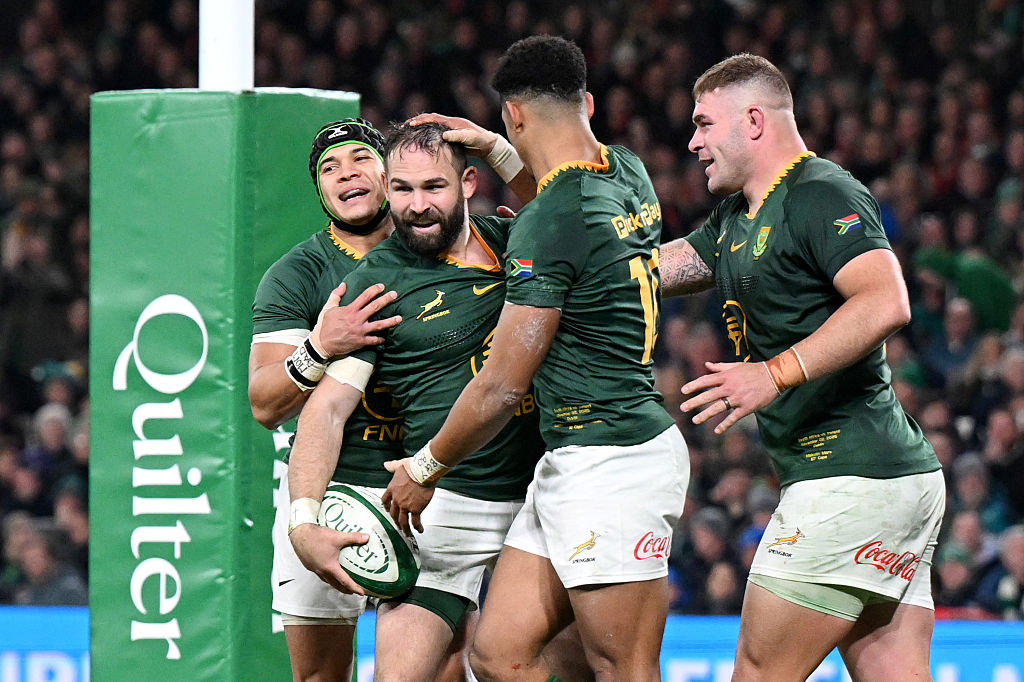
Springboks No 9 Cobus Reinach plays his 50 Test in Saturday’s season finale against Wales in Cardiff. It is a salute to a remarkable Test career, in which Reinach has shown that patience is a virtue and from patience comes the ultimate rewards, writes Mark Keohane.
I’ve covered enough Test rugby since 1992 to know that some players arrive like fireworks, bright and loud, and then disappear before the smoke has even cleared. And then there are players like Cobus Reinach, who is built on staying power, steel, speed, and a stubborn refusal to ever be counted out.
Reinach’s 50th Test comes 11 years after he debuted for the Boks at Newlands against Australia in 2014. He was 24 then. He is 35 now, and he looks quicker today than he did the afternoon he played his first Test.
That alone tells you everything about the athlete and the attitude.
But to salute Reinach purely as a survivor undersells him because he has thrived wherever he has played, be it in South Africa, England or France, at club level or for the Springboks.
He has done more than most scrumhalves who have ever worn the No 9 jersey for South Africa. Two World Cup titles and a hattrick in four minutes – the fastest in Rugby World Cup history – against Canada in 2019. He has scored 19 tries in 49 Tests.
And then there’s what he has done in the past month: two individual tries, each worthy of its own movie trailer. There was the crucial scorcher against France at the Stade de France in Paris that showcased his straight-line speed, and one as important against Ireland in Dublin, where again instinct and acceleration combined for five points.
Reinach has been electric throughout the Castle Rugby Championship and the November internationals, whether starting or closing out the Test.
Reinach, who made his Stormers debut a fortnight after being part of the Boks’ Rugby Championship title defence, played nine consecutive years overseas, at Northampton’s Saints for four years and then for the past five at Montpellier in France, where he finished on 103 matches. He played 76 for the Saints.
BOKS GO FOR THE KILL AGAINST WALES
He was never a case of ‘out of sight and out of mind’. He was always a part of the national equation under Erasmus and Jacques Nienaber.
Rassie Erasmus, speaking after the 2019 World Cup pool win over Canada, said: “Cobus is one of the best finishers in world rugby. His speed is one thing, but his attitude is what sets him apart. He never stops working.”
Jacques Nienaber has always maintained: “Cobus brings intensity. Whether he plays ten minutes or 80 minutes, he changes the game. That’s his gift.”
Montpellier’s Philippe Saint-André, upon his arrival at the French club, called Reinach “the fastest scrumhalf in the world – and the most professional player in the squad.”
Teammate Jesse Kriel, ahead of the 2023 World Cup playoffs, said: “Cobus doesn’t age. He trains like a 20-year-old and competes like a Springbok who knows the standard. We trust him with our lives.”
Even the great Aaron Smith, after the Boks beat the All Blacks in Auckland in 2014, commented privately (later repeated in interviews): “That No 9 is rapid. South Africa have something special there.”
WIN WITH THE BOKS & AFRICA PICKS
Everyone who has ever played with him or against him has said the same thing in different ways: Reinach is a game-breaker. You blink and he is gone. You hesitate and he burns you. You switch off and he is already under the posts.
For me, the beauty of Reinach’s Test career is that it hasn’t followed the script. It hasn’t been linear or predictable. He never became the “permanent” Bok No 9, but he became something far more valuable in being the player who can tilt a Test match at any moment, from anywhere on the field. He has been and is a player whose selection is never a gamble, because the return is almost always guaranteed.
KEO & ZELS TALK BOKS AND COBUS REINACH
He is the definition of a 23-man squad player in the modern era: dependable, devastating, disciplined.
Reinach’s route wasn’t easy and many within South Africa felt that he left the country when at the peak of his powers, but he continued to improve at the Saints and Montpellier.
His club mates speak of his lack of ego, his obsession with conditioning, his attention to video detail and his leadership and mentoring of newbies or less experienced players.
Saint-André once joked: “Cobus doesn’t drink wine. He doesn’t eat dessert. He eats speed.”
At 35, playing his 50th Test, he is still eating speed and burning international defences.
When I think of Reinach, I think of the Springboks’ identity under Erasmus and Nienaber, which is one rooted in readiness and not reputation.
There have been exceptional scrum halves playing for South Africa in the past 11 years, which is a statement on its own that Reinach gets to 50 appearances in Cardiff.
Cobus Reinach’s career is a lesson in perseverance, professionalism, and possibility, and a reminder to every wannabe Springboks scrum half in South Africa about consistency and relentless work ethic.
READ SA RUGBY MAG FOR ALL THE BOKS V WALES TEST PREVIEWS
International Rugby
Boks are back in Cardiff and going for the kill against Wales
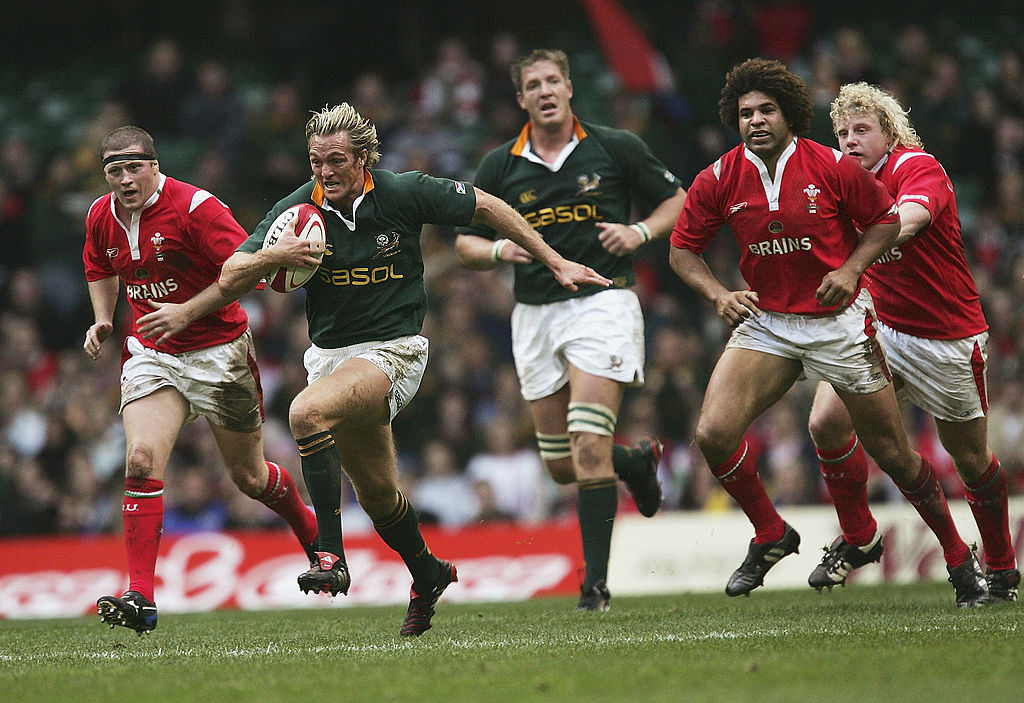
There will be no let off from Rassie Erasmus’s Springboks in their final Test of 2025 in Cardiff against Wales, and that is the attitude there should be from the sport’s best team, the official No 1 team for 2025 and the current World Cup holders, writes Mark Keohane.
Springboks coach Rassie Erasmus has shown Welsh rugby the utmost respect by picking his strongest available match 23 for a Test the Boks are expected to win with a record score.
Wales are without 13 of the players who fronted the All Blacks a week ago, and while the Boks are missing as many, there is no comparison in the quality of depth in both national camps.
Wales have won just two of their last 20 internationals, but there is a high regard within the Boks set-up, especially from Erasmus for what Welsh rugby represents.
There was a time, not long ago, that Wales was smashing the Boks, has been a consistent echoed by Erasmus this week.
In Erasmus’s first tenure as Bok coach, he won just seven from 14 Tests, losing to Wales in Washington DC in his first Test in charge and finishing the season beaten in Cardiff by Wales again.
There was the brutal 16-9 World Cup semi-final win in Japan in 2019, but what followed was a last minute win, via a Damian Willemse penalty at Loftus, a last minute defeat in Bloemfontein and then a tough 30-14 win in Cape Town to seal a 2-1 home series win.
In the past few seasons, it has settled more in Erasmus’s favour and Cardiff has become the happy hunting ground it was for Erasmus as a player.
Erasmus appreciates and recognises tradition and he knows just how passionate the Welsh are about their rugby.
They may be in a slump, but it was only eight years ago and Boks supporters were burning the Boks jersey and Wales were on a winning streak against the Springboks.
Erasmus has honoured the meaning of Test rugby with the strength of his selection, but also showcased how brilliantly he has integrated new squad players, post the 2023 World Cup, and managed the playing demands of veterans he is giving every chance to make it to Australia in 2027 for the challenge of an unprecedented third successive RWC title.
Carifff is a great city for Test rugby fans, none more than the Boks supporters, with so many making the trip down from London and various part of England, Scotland and Ireland.
The Principality Stadium is a rugby cathedral and magnificently impressive in terms of a spectator experience.
I was fortunate to report on the Boks win against Wales in 1996, which was the last time they played at the Cardiff Arms Park, before construction began for the building of the Millennium Stadium, which is now the Principality Stadium, right opposite the famous Angel Hotel, where again I was blessed to stay in the week the Springboks beat the All Blacks in the 1999 World Cup play-off for third place.
Breyton Paulse scored the only try of the play-off.
In my time covering the Springboks and being a part of the management, I have wonderful memories of great wins, even more impressive post-match experiences celebrating and a rich joy at the gift it is to write about and, having been part of, the Springboks.
The 1996 win was sweet and compelling. The Boks won 37-20 in what would be Andre Markgraaff’s last Test in charge.
The next time the Boks beat Wales away from home was at Wembley Stadium in 1998, as the Millennium Stadium had not been finished.
I missed the 1999 once-off visit to the Millennium Stadium when the Welsh stunned Nick Mallett’s Springboks. The Stadium was not yet complete, in terms of the stands, but the day is a historic one for Wales.
I was back with the Springboks under Harry Viljoen, working as Communications Manager, and the Boks won a difficult match 23-13 in 2000. We returned to Cardiff for the last match of the tour to beat a star studded Barbarians 41-31, and then did a Sunday all night season-ending party at the Walkabout in Mary Street. It was glorious.
There were wins for Jake White’s Boks in 2004, 38-36, in a match where Newport-based Percy Montgomery thrived and produced a Player of the Match performance. White’s Boks also won comfortably in 2005 and 2007 and Pieter de Villiers’s Boks enjoyed success in Cardiff in 2008 and 2010.
Heyneke Meyer continued the Boks success story in Cardiff in 2013, but in 2014 his Boks lost 12-6.
This started an unprecedented period of Welsh dominance over the Boks in Cardiff, with Bok coach Allister Coetzee’s team losing in 2016 and 2017.
Erasmus’s Boks lost 20-11 in 2018, but ever since then it has been all South Africa in Cardiff.
Frans Steyn, as a replacement, turned back the clock with a glorious kicking display to engineer a 23-18 escape for the Boks in 2021 and in 2023 Jacques Nienaber’s Boks, en-route to the World Cup, produced the biggest ever win for the Boks against Wales in Cardiff.
The Boks won 52-16 and completed their 2024 season with a 45-12 win.
KEO & ZELS: BOKS TO BURY WOEFUL WELSH
The bookies have given Wales a 38 point start, which means if you bet on them losing by under 38 points you are in the money and if you go with the Boks to win by more than 38 points, you are in the money.
WIN WITH AFRICA PICKS – BACK THE BOKS
If the Boks do win by 38 or more points, then it will represent another record for Erasmus and Siya Kolisi’s already record-breaking world champions.
It’s good to be back in Cardiff, after a decade of missing this match-up from the seats of the Principality’s Press Box.
The city is still humming and selfishly the Boks are the ones on a winning streak and favoured to make it five wins in succession against the Dragons.
READ SA RUGBY MAG FOR ALL BOKS V WALES TEST BUILD-UP
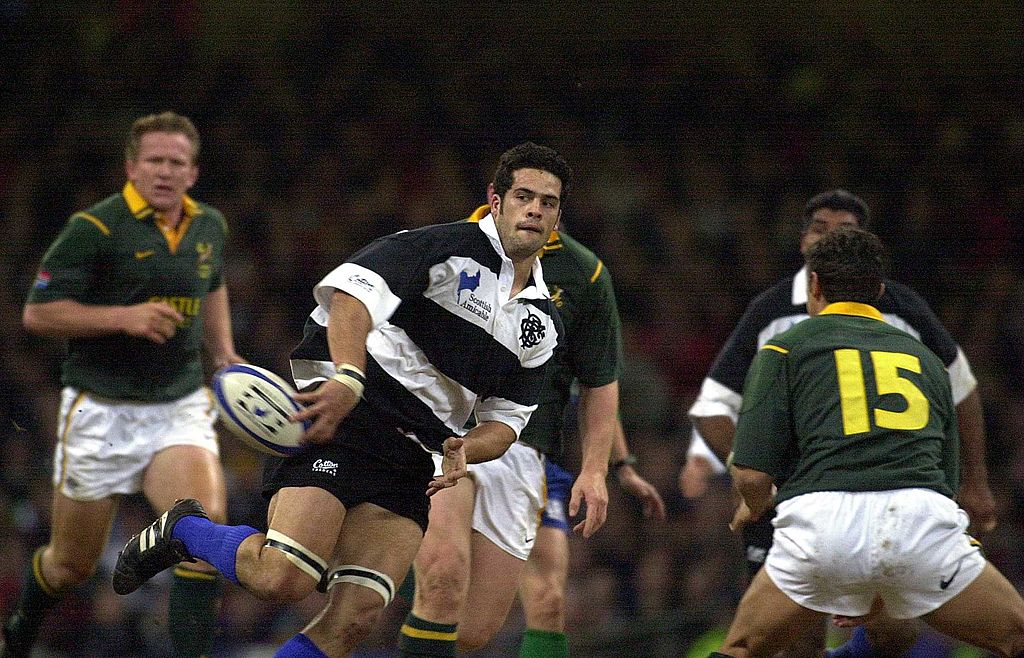
International Rugby
Boks scrum a STECO Power Play of brutal beauty
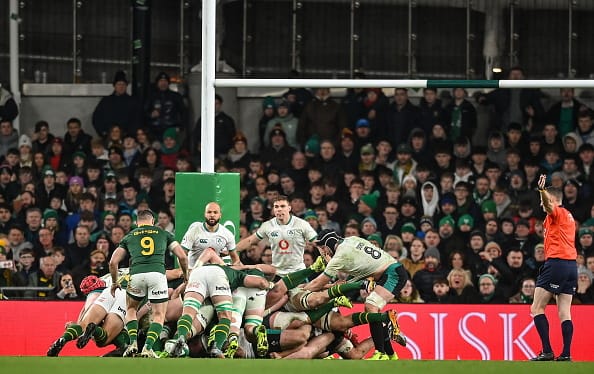
Keo & Zels were as emphatic as the Boks scrum against Ireland that the STECO Power Play was every time the Boks packed down to scrum Ireland into the Aviva turf in Dublin.
STECO is all about power, precision, sustainability and quality, and Keo & Zels, on their Rugby Podcast, said every member of the Boks pack combined to make the collective that much more powerful than any individual effort.
They acknowledge the individual try-scoring genius of Sacha Feinberg-Mngomezulu, the individual merits of Cobus Reinach, the relentlessness of Canan Moodie and the power of Damian de Allende.
But when it came to their weeks Springboks STECO Test moment, it was the Boks scrum that won the day, with the Boks feeding the scrum in 12 of the 16 scrums, and winning eight penalties on the 12 put ins. There were also more scrums on resets.
Ireland lost two players to yellow cards because of repeated scrum infringements and conceded a penalty try just before halftime to trail 19-7.
WORLD MEDIA REACTS TO POWER OF THE BOKS SCRUM
The general consensus, post the match, was that Ireland should have lost more players to the sin-bin for deliberate professional fouls at scrum time.
The Boks won 24-13; their first win at the Aviva Stadium during Rassie Erasmus’s eight years at the helm of the Springboks. It was also only the second time the Boks had played at the Aviva Stadium since Erasmus and Jacques Nienaber took charge of the Boks in 2018.
Ireland, who beat the Boks 13-8 in Pool Play at the 2023 Rugby World Cup in Paris, France, also beat the Boks 25-24 in Durban in 2024, a week after losing 27-20 to the hosts in Pretoria in the opening Test of the July internationals.
IRISH LOCK GETS SLAP ON WRIST FOR RED CARD OFFENCE
STECO IS GIVING YOU BACK YOUR POWER
The Powerful Bok scrum earns this week’s @STECO_Global #PowerPlay award! pic.twitter.com/5Cbpy9tHJt
SA Rugby magazine (@SARugbymag) November 25, 2025
International Rugby
Rugby’s world media reacts to Springboks win in Dublin

The world’s media lauded the dominance of the Springboks in Dublin against Ireland and were awed at the physicality of the world champions and No 1 team in the sport.
A summary of how the global rugby media reacted to the Springboks 24-13 win in Dublin.
The Boks scored four tries to one.
The Irish Times – Gerry Thornley
Thornley framed it as “the one that got away” for Ireland and a long-time-coming statement win for South Africa. He highlighted the Boks’ scrum dominance and physical edge, but also the surreal card chaos and inconsistency around Sacha Feinberg-Mngomezulu’s high shot versus the multiple Irish cards, leaving Ireland feeling hard done by while still acknowledging South Africa as clearly in control. The Irish Times
Irish Examiner – Simon Lewis
Lewis hit the same two big notes: Ireland’s “ill discipline” and the Springboks’ set-piece power. Ireland’s yellow-card avalanche and James Ryan’s 20-minute red created an unwinnable scenario against a pack as dominant as this Bok eight. He stressed that, even with 12 men, Ireland showed guts, but the champions were ruthless enough to end their Dublin drought. Irish Examiner
Sunday Independent (Ireland / Independent.ie cluster) – Edward Elliot & Indo Sport team
On the UK Independent (closely echoing the Indo line), Edward Elliot’s match report headlined the game as “cards, chaos and carnage” and said Ireland “paid a heavy price for ill-discipline” as South Africa ended a 13-year wait for an Aviva win. The coverage zeroed in on the five Irish cards, the decisive scrum penalty try, and Sacha’s solo effort that effectively killed the contest, while stressing that Ireland’s late fight only reduced the margin, not the gap. The Independent
On Independent.ie (Irish), the locked match piece – “Springboks’ scrum power proves unstoppable for Ireland after flurry of yellow cards” – is clearly framed around the same themes: scrum dominance, card carnage, and Boks in control. The Independent
Sunday Times (Ireland)
-
Boks physically and tactically superior at scrum time,
-
Ireland’s indiscipline fatal.
The Rugby Paper (UK) – John Fallon
Fallon’s match coverage in The Rugby Paper described a “scrum masterclass” from the Springboks and a self-inflicted implosion from Ireland. His tone was that of respect for Ireland’s resilience but little doubt about who was boss: the world champions used the set-piece to squeeze, strangle and finally break Ireland, leaving Farrell with more questions than answers two years out from 2027. The Rugby Paper
The Guardian – Brendan Fanning
Fanning’s Guardian match report ran under the headline “South Africa make heavy weather of victory over indisciplined Ireland”. He called it “a truly crazy event”, stressing how four Irish players were binned in the first half, Ryan’s card was upgraded to red, and the Boks only really converted their scrum supremacy when Ireland were down to 13. His core critique: a team this dominant at set piece should win far more comfortably – but they still reminded Ireland of the gap in power when it really mattered. The Guardian
The Telegraph (UK)
The Telegraph’s live coverage and write-up is trailed with the line that Ireland’s future questions “come to the boil” after a “plucky defeat” in which the scrum was “utterly dominant” in South Africa’s favour and Ireland were reduced to 12 men. From the available blurb, the angle is:
-
Ireland’s card-fuelled collapse at the set piece,
-
South Africa’s ruthless exploitation of that edge,
-
and the uncomfortable question of whether Ireland are slipping behind the Boks again in raw physicality and depth. The Telegraph+1
French Rugby & European Press
L’Équipe (France)
L’Équipe’s live commentary and report framed it as a “demonstration de force” by the double world champions, noting that after conquering Paris and Rome this November, the Boks had now imposed themselves in Dublin as well. They highlighted:
-
a monstrous scrum and maul,
-
Sacha Feinberg-Mngomezulu’s class with ball in hand,
-
and an Irish side that remained combative but simply couldn’t live with the Springboks’ power and pressure over 80. L’Équipe
Midi Olympique / Rugbyrama
Midol and Rugbyrama carried pieces and social posts casting the Boks as “seemingly invincible”, talking of South Africa “continuing their festival in the north” with another statement win. The tone is almost admiringly fatalistic: this Bok side, in French eyes, has turned Europe into its playground – Dublin now joining Paris and Marseille as venues where they impose their will.
New Zealand & Global
NZ Herald – AFP report
The Herald ran an AFP match report: South Africa’s first win in Dublin since 2012 after a 24–13 victory over an “ill-disciplined Ireland side that at one point was reduced to 12 men.” It underlined:
-
tries by Willemse, Reinach and Feinberg-Mngomezulu plus a penalty try,
-
Ireland’s courage in keeping the scoreline respectable,
-
and the personal milestone for Rassie Erasmus finally winning at Lansdowne Road, something he hadn’t done even as Munster coach. NZ Herald
South African Print & Online
Rapport – Louis de Villiers (Netwerk24)
De Villiers’ column “Bok-stutte wys hul spiere in Dublin-orgie van kaarte” (“Bok props flex their muscles in a Dublin orgy of cards”) sums up Rapport’s mood. He revels in the Bok front row’s destruction of Ireland’s scrum and embraces the madness of the yellow-card storm, effectively arguing:
-
chaos or not, this was a deeply satisfying, forward-dominated away win,
-
and a reminder that in the trenches, the Boks remain unmatched. Netwerk24
Sunday Times (South Africa) – Mark Keohane
In the Sunday Times, Mark Keohane’s column “Boks shake off Irish monkey” (as flagged in SA Rugby Mag’s wrap) celebrates the end of the Dublin hoodoo. His core beats:
-
Ireland were “brave”, but the Boks were “brutal”,
-
the scrum and collision dominance finally aligned with the scoreboard,
-
and Rassie’s world champions have reclaimed the psychological high ground in what’s now the sport’s premier rivalry. SA Rugby magazine
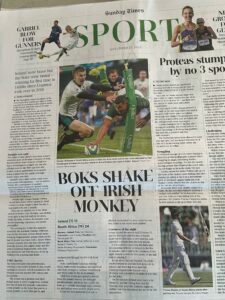
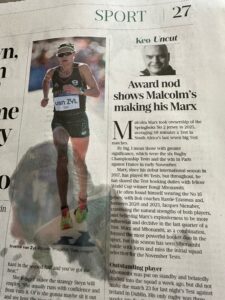
SA Rugby Magazine (sarugbymag.co.za)
SA Rugby Mag’s online coverage led with pieces like “Boks break Dublin deadlock” and “Boks crush ill-disciplined Ireland”, plus a deep-dive analysis referencing Keo’s pre-game call that the Boks would win by 11. The tone is unapologetically triumphant:
-
Dublin “belonged to the Boks” for the first time in 13 years,
-
Ireland’s aura at Lansdowne took a serious dent,
-
and the win validated Rassie’s decision to go full strength and target this fixture as the unofficial World Cup rematch that 2023 never gave them. SA Rugby magazine+1
Rugby365
Rugby365’s match report (and sidebar pieces) emphasised that the Springboks “ended their Dublin drought despite chaotic scenes” – focusing on:
-
the Boks’ dominance at scrum time and in the collisions,
-
the unprecedented five Irish cards to one South African,
-
and questions over Matthew Carley’s consistency, even while acknowledging that Ireland’s discipline invited trouble and the better team still won.
Planet Rugby
Planet Rugby’s early reaction came via their news and social channels: “Springboks too strong for ill-disciplined Ireland” and “five Irish cards in chaotic Dublin Test.” Their line is simple and punchy:
-
South Africa bullied Ireland at the set-piece,
-
ill-discipline wrecked any hope of a home win,
-
and the result re-asserts the Boks as the team to beat heading towards 2027. Planet Rugby
RugbyPass
RugbyPass ran player ratings and reaction pieces with the headline flavour of “Ireland player ratings after ruthless Springboks dismantle Andy Farrell’s men” and similar. The ratings hammered Ireland’s discipline and scrum, while giving big numbers to Malcolm Marx, Boan Venter, Eben Etzebeth and Sacha Feinberg-Mngomezulu. The key RugbyPass take:
-
this was a statement win from the Boks,
-
Ireland’s supposed set-piece improvements were “exposed” under real pressure,
-
and the contest showed there’s still a gap in depth and physicality between the sides. rugbypass.com
Keo.co.za – Mark Keohane
On Keo.co.za and its AfricaPicks crossover piece, Keohane doubled down after calling Boks by 11 in the build-up. His reaction article, effectively a victory lap, framed the win as:
-
Rassie’s Boks reasserting themselves as the sport’s true No 1,
-
Ireland’s Lansdowne aura being shattered in 80 ugly, beautiful minutes,
-
and confirmation that the rivalry is now tilted back towards South Africa, with Dublin no longer a graveyard but another green-and-gold hunting ground. SA Rugby magazine+1
Other Significant Angles
Several other outlets pushed similar themes that echo across your requested titles:
-
ESPN (Tom Hamilton): “Cards, chaos and a challenge answered” – Boks reminded Ireland of the gap in a bruising win, ending a 13-year wait in Dublin. ESPN.com+1
-
Daily Maverick (SA): “Springboks end Dublin drought against ill-disciplined Ireland” – very much in line with the Irish Examiner / ESPN story-arc. Daily Maverick
Quick Summary of the Global Mood
Across the spectrum – Irish, UK, French, Kiwi and South African:
-
Everyone agrees the game was utterly chaotic: a once-in-a-decade card-fest.
-
Irish writers strike a balance between feeling aggrieved at some decisions and admitting their side’s indiscipline and scrum issues cost them.
-
Neutral & global outlets (ESPN, AFP/NZ Herald, L’Équipe) frame it as a clear, deserved Bok win driven by set-piece domination, against an Ireland who never quite folded but were outgunned.
-
South African outlets are openly celebratory: the “Dublin curse” is gone, the rivalry is reset, and Rassie’s Boks have just walked into Ireland’s fortress and kicked the door down.
*Courtesy of ChatGPT 5.1 & all verified references
International Rugby
Boks by 11 is the universal number it was meant to be in Dublin
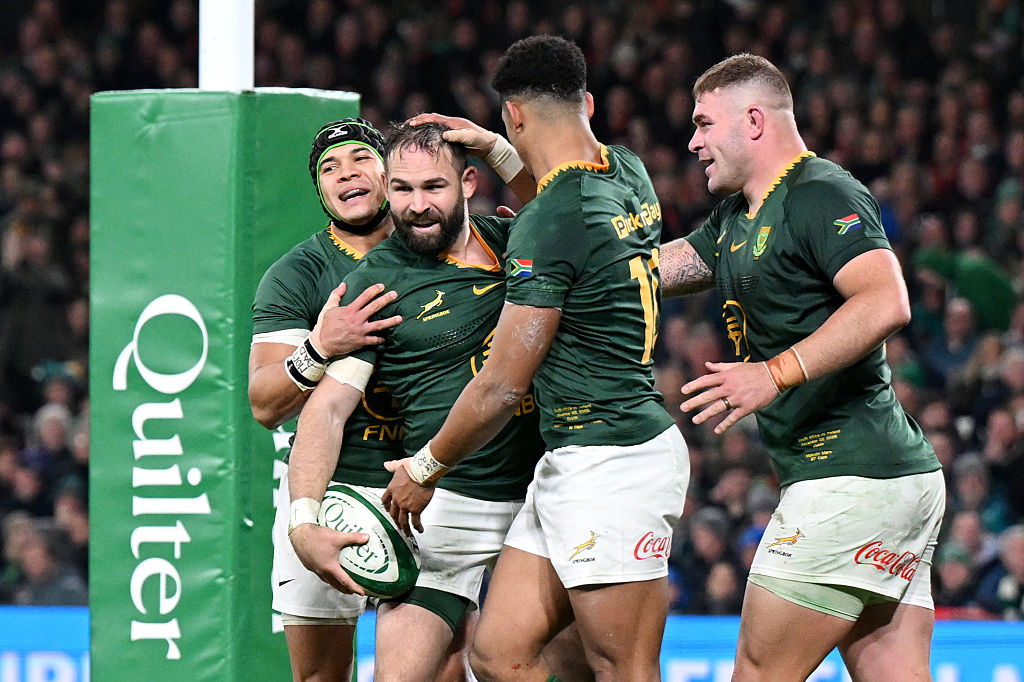
The Boks won by 11 points in Dublin, and the No 11 is often called a “master number” in numerology, and is thought to represent intuition, insight, and enlightenment. Add power and brutality and you have a summary of what happened at the Aviva Stadium against Ireland on Saturday night, writes Mark Keohane.
This was an assault.
If it was a boxing match, Ireland would have been counted out by the referee at halftime.
In rugby terms, this was not going to happen as the Irish spirits refused to yield to a knock out and the referee, deducting points throughout, refused to send Ireland to the corner on a TKO.
There can be no complaints in Dublin or anywhere in Ireland. The hosts were beaten up physically, lost by four tries to one, and should have finished the game in single player figures.
Ireland’s James Ryan should have had a straight red card and not the kindness of bunker review on his awfully malicious and cheap off the ball clenaout on the head of Boks hooker – and World Rugby Player of the Year – Malcolm Marx.
The record books will show the Irish got one bunker red and four yellow cards and the Boks got one. The Boks’ yellow card, in the 78th minute, was for celebrating a turnover. WTF!
It was an interesting call, to say the least, but the Boks refused to yield and kept Ireland scoreless in the last two minutes, when every call went Ireland’s way.
So much in Dublin has been made of Rassie Erasmus’s Golden Generation of Springboks never having won in Dublin between their RWC title wins in 2019 and 2023, which included a 2-1 home series win against the British & Irish Lions in 2021, with all three Tests played in Cape Town behind closed doors.
The Boks, back to back World Cup winners in 2019 and 2023, back to back Castle Rugby Championship winners in 2024 and 2025, Lions series winners in 2021, have also won in Italy, in Argentina, in Scotland, in Australia, in New Zealand, in Wales, in England at the Allianz in Twickenham, in Japan in the 2019 WRC and in France in the 2023 RWC.
The only country Erasmus’s boys had not won was in Dublin, courtesy of a three point defeat (19-16) in 2022.
Ireland, who have never advanced beyond a RWC quarter-final in 10 tournaments, held onto the Dublin win as justification as to why they should be considered the best team in the world.
That all ended on Saturday night and now Ireland’s claim to being the world’s best is to win the RWC, which would mean making history in going beyond the last eight in Australia in 2027.
Ireland has nothing left in bragging rights when it comes to the Boks, and they have a long wait until they meet the Boks in Dublin in November in 2026 in the inaugural Nations Championship.
For those South Africans working and living in Dublin, enjoy the next 12 months.
HOW KEO CALLED THE BOKS WIN ON AFRICA PICKS
The scoreline of 24-13 was kind to Ireland and the rugby gods were generous in allowing Ireland to leave the Aviva with scoreline respectability, even if the state of play should have read 30-plus points, and not the 11 differential.
The Irish were brave and they ripped up the law book to defend their try line. Their scrum was humiliated and on another night they may have ended up with no forwards on the field.
They will cry foul for the cards, but every single one was justified and there were more that should have gone against them.
They played for damage control and the Boks played to bury the hyped talked about ghosts of the Aviva.
The Boks won at the Aviva for the first time in 13 years, but it may be 13 years before Ireland ever threatens the Boks at the Aviva, such was the one-sided nature of the contest.
Ireland, when they review the match tape, will wonder how they did not concede 40-plus points, and the Boks, once the beers and brandy have settled, will wonder how they did not score 40-plus points.
For South Africa, the score will not matter, just the fact that Dublin was downed, not as smoothly as a Guinness, but with the brutality these boys put away a double brandy.
Boks by 10- plus 1.
KEO & ZELS INSISTED BOKS WOULD WIN IN SAYING RASSIE’S COWBOYS WOULD GUN DOWN IRELAND
READ SA RUGBY MAG DIGITAL FOR ALL REACTION TO THE BOKS 24-13 WIN v IRELAND IN DUBLIN
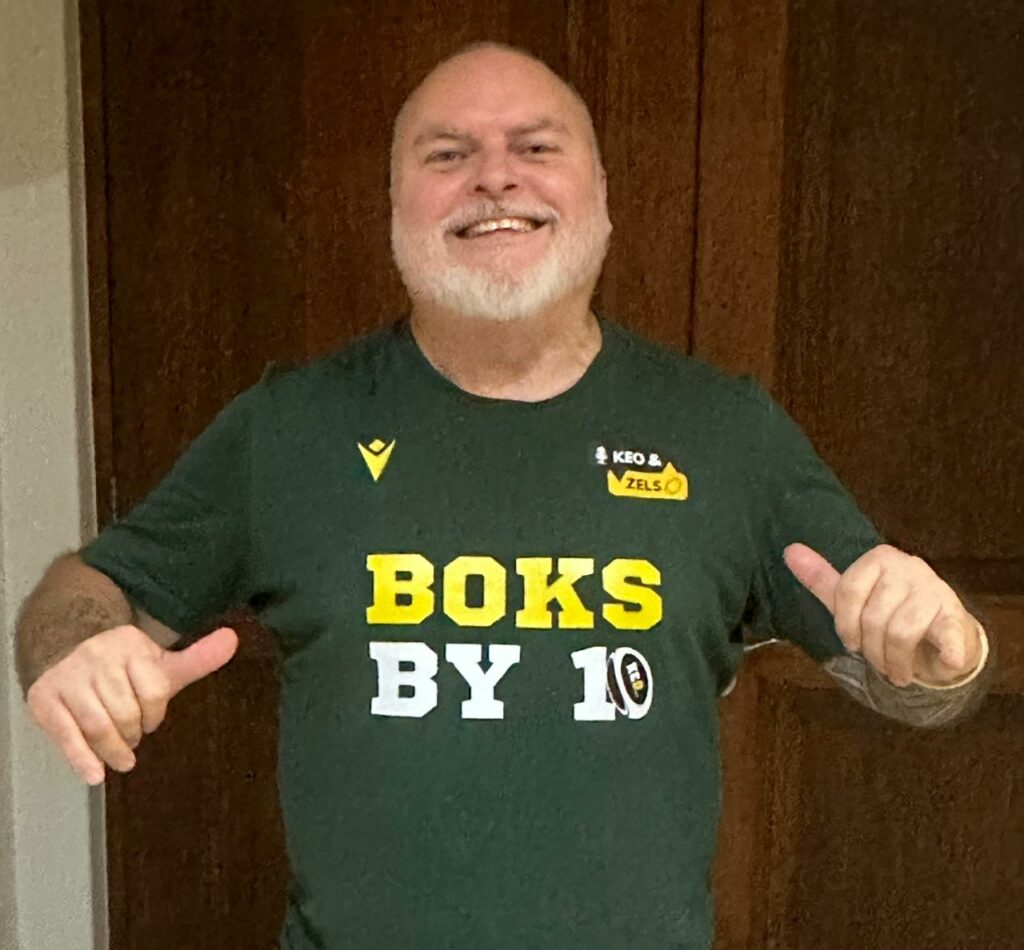
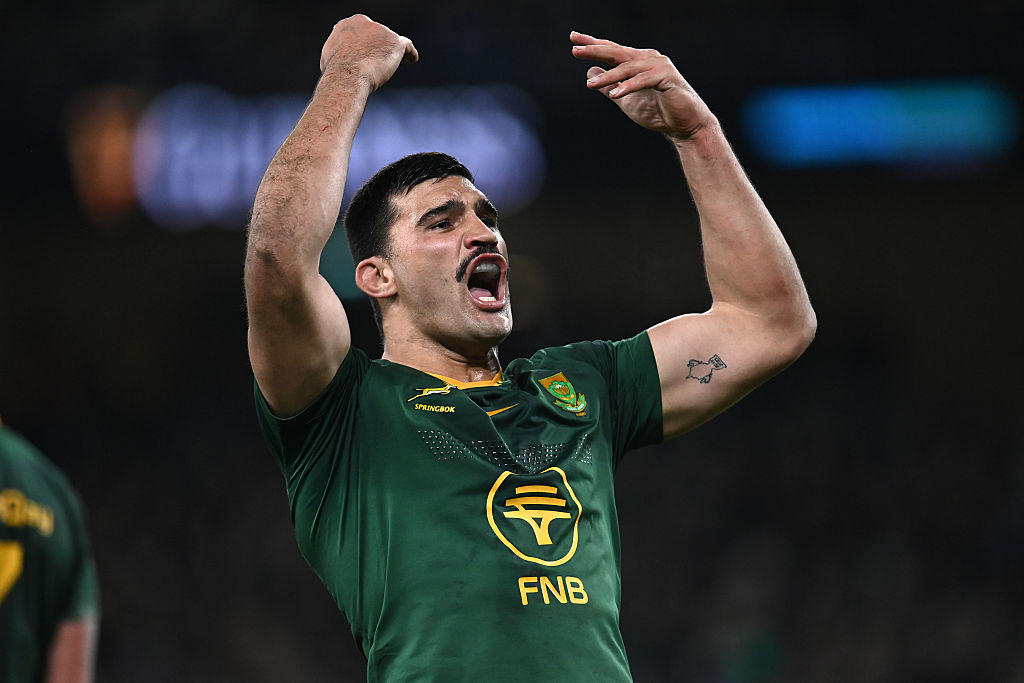
International Rugby
Why Sacha at No 10 is the key to finally breaking impressive Irish
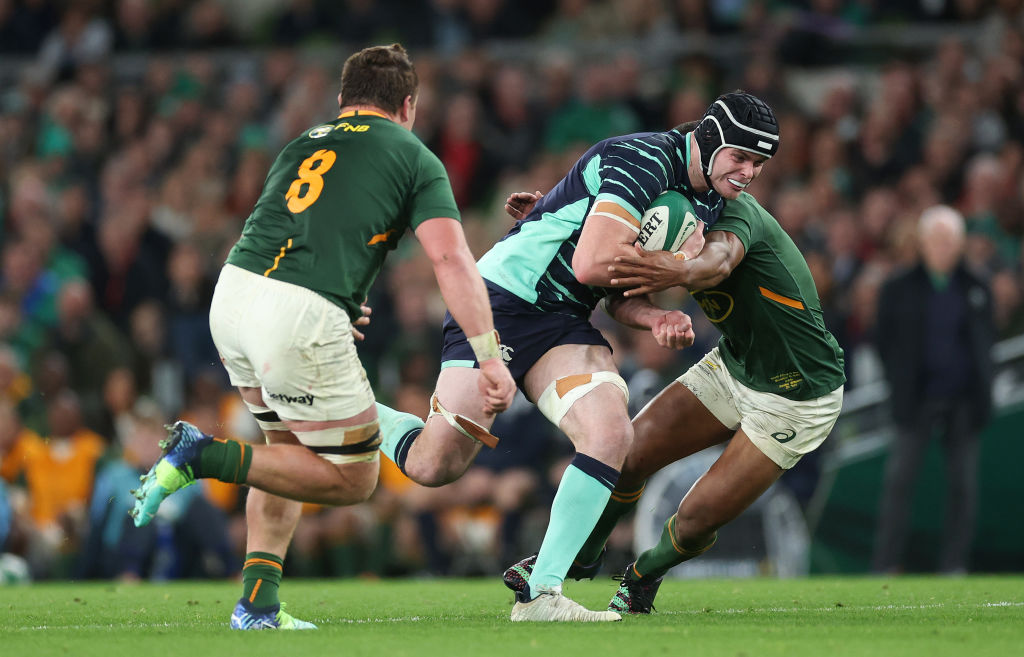
Sacha Feinberg-Mngomezulu is the playmaker the Springboks have not had at No 10 in their last four Tests against an Ireland team, who have found a way to win in three of those matches, writes Mark Keohane.
For all the dominance of the Springboks under Rassie Erasmus and for five of those years, from 2019 to 2023 Jacques Nienaber and Erasmus, Ireland is the one team that has matched the Boks minute for minute, try for try and big moment after big moment.
Respect is due to the Irish because they are the one side that has no inferiority complex when it comes to Erasmus’s all-conquering back to back World Cup winners and back to back Castle Rugby Championship winners.
Erasmus and Nienaber only played one Test against Ireland in Dublin since returning from Munster, Ireland to coach the Boks in 2018.
It was in 2022 and Ireland won 19-16.
A year later, at the Stade de France in Paris, Ireland won 13-8 and the teams drew a two-test series in South Africa in 2024, with the Boks winning 27-20 at Loftus Versfeld in Pretoria and losing with the final kick of the game 25-24 in Durban.
Those four Tests are the only historical relevance to Saturday’s match-up in Dublin because the core of the players remain from 2022, on both sides, as does the coaching leadership.
Erasmus, after the win in Pretoria, said the squad felt they had got ‘a monkey off our backs’ in beating Ireland, but Dublin, even though it has only been over one Test and 80 minutes in 2022, sits more like a Gorilla on the backs of the Boks than a Monkey.
Earlier this season the Boks stumbled at Eden Park in Auckland, losing 24-17 to the All Blacks, having found themselves 14-0 down within the opening 10 minutes. It was a massive disappointment for the squad as there was such belief they could be the history-makers to end the All Blacks unbeaten run at 50 Tests at Eden Park; a run that now sits at 52.
Dublin carries a similar kind of mission. Win there and then this squad, many of whom are into their eight International season together, would have conquered every team in their own respective backyards.
Ireland, who won 19 in succession at the Aviva Stadium before losing to the All Blacks in 2024, also got whipped by France in the Six Nations last season.
For the most the Aviva has proved a fortress and the respect of the occasion, from both sides, is emphasised by how little click bait headlines there has been in the build-up.
It has been the most dignified of days, with Erasmus heaping praise on Ireland and Irish coach Andy Farrell being as flattering of the Boks in response.
Players on both sides have said little and those who have spoken at media conferences have talked up the magnitude of the occasion and the virtues of their opposition.
The Boks, like Ireland, have said they have to be at their best to win.
Even the dark world of social media has been more an ocean of calm and reverence.
Ireland’s faithful can simply state three wins from four, one in Dublin, one in Paris and one in Durban when backing their side, while the Boks supporters comeback is to remind Irish fans of the 2023 World Cup, the 2019 World Cup, the 2007 World Cup and the 1995 World Cup, all won by the Springboks.
Statistically, half a point separates the two teams over the four Test matches, with Ireland’s 19.25 edging the Boks 18.75. In four matches, Ireland has scored 77 points to South Africa’s 75 and seven tries to six.
Feinberg-Mngomezulu was among the substitutes in Pretoria and Durban and if the Boks are to win in Dublin, he needs to be starting at No 10.
Pollard, who kicked eight penalties in Durban, also started at No 10 in Pretoria, while Damian Willemse started at No 10 in Dublin 2022 and Manie Libbok started at No 10 in Paris in 2023. In both those defeats, the missed penalties and conversions proved costly for the Boks.
Ireland have earned the right to be favourites in Dublin, even though the bookies have the Boks as favourites.
AFRICA PICKS: PREDICT THE SCORE IN DUBLIN AND WIN WITH THE BOKS
Springboks World Cup winners Willemse, Cheslin Kolbe, Jesse Kriel, Damian de Allende, Kurt-Lee Arendse, Pollard, Jasper Wiese, Pieter-Steph du Toit, Siya Kolisi, Kwagga Smith, Eben Etzebeth, RG Snyman, Franco Mostert, Malcolm Marx and Bongi Mbonambi have all been part of those match day squads who have come second in three of the four match-ups.
Those are some power names and among the best to have ever played for the Springboks. They are also among the best in the world.
There will be another opportunity in Dublin in 2026 when the Boks play a league match against Ireland in the inaugural Nations Championship, but for some of the big name veterans, this may be their last hurrah to get that elusive win in Dublin.
KEO & ZELS: RASSIE ON RED ALERT FOR DUBLIN DELIGHTS
SA RUGBY MAG: IRELAND HAVE THE BOKS NUMBER
Ireland 19 Springboks 16
Aviva Stadium, Dublin, 2022
Ireland held of a late charge by the Boks to underline their status as the No 1-ranked team in world rugby. In a tight game featuring two tries apiece, the Boks missed seven points off the kicking tee which proved crucial in the end.
Ireland: Keenan; Baloucoune, Ringrose, McCloskey, Hansen; Sexton (capt), Murray; Porter, Sheehan, Furlong, Beirne, Ryan; O’Mahony, Van der Flier, Doris. Subs: Herring, Healy, Bealham, Treadwell, Conan, Gibson-Park, Carbery, O’Brien.
South Africa: Kolbe; Arendse, Kriel, De Allende, Mapimpi; Willemse, Hendrikse; Kitshoff, Marx; Malherbe, Etzebeth, De Jager, Kolisi (capt), Du Toit, Wiese. Subs: Mbonambi, Nche, Koch, Mostert, Fourie, Smith, De Klerk, Le Roux.
Stade de France, Paris, 2023
A truly thunderous affair which lit the torch paper on the 2023 World Cup. The game was played before a crowd of over 78,000. It was epic. It was brutal. And it ended in a third consecutive win for the Irish over their southern hemisphere rivals. It was also Ireland’s 28th win out of their last 30 matches.
South Africa: Willemse; Arendse, Kriel, De Allende, Kolbe; Libbok, De Klerk; Kitshoff, Mbonambi, Malherbe, Etzebeth, Mostert, Kolisi (capt), Du Toit, Wiese. Subs: Fourie, Nche, Nyakane, Kleyn, Snyman, Van Staden, Smith, Reinach.
Ireland: Keenan; Hansen, Ringrose, Aki, Lowe; Sexton (capt), Gibson-Park; Porter, Kelleher, Furlong, Ryan, Beirne, O’Mahony, Van der Flier, Doris. Subs: Sheehan, Bealham, Kilcoyne, Henderson, Baird, Murray, Crowley, Henshaw.
Springboks 27 Ireland 20
Loftus Versveld, Pretoria, 2024
Part of an incoming two-Test tour, the Springboks managed to bag a first win against Ireland since 2016. Bok coach Rassie Erasmus admitted afterwards that it felt great to finally get the win as “they really had our number”. Still, it was a tight contest decided on a couple of marginal calls involving the TMO. The Boks showed early season rustiness against an Ireland team who a few months earlier had claimed another Six Nations crown but managed to hold out for an important victory.
South Africa: W le Roux; C Kolbe J Kriel, D de Allende KL Arendse; H Pollard, F de Klerk; O Nche, B Mbonambi, F Malherbe; E Etzebeth, F Mostert; S Kolisi (capt), PS du Toit, K Smith. Subs: M Marx, G Steenekamp, V Koch, S Moerat, RG Snyman, M van Staden, G Williams, S Feinberg-Mngomezulu.
Sin-bin: Arendse, 73
Ireland: J Osborne; C Nash, R Henshaw, B Aki, J Lowe; J Crowley, C Casey; A Porter, D Sheehan, T Furlong; T Beirne, J McCarthy; P O’Mahony (capt), J van der Flier, C Doris. Subs: R Kelleher, C Healy, F Bealham, J Ryan, R Baird, C Murray, C Frawley, G Ringrose.
Sin-bin: Kelleher, 78
Springboks 24 Ireland 25
King’s Park, Durban, 2024
An absolute humdinger which was decided by a last-minute drop goal by Ciaran Frawley. The win saw the series spoils shared and was a fitting way to celebrate Ireland coach Andy Farrell’s 50th match in charge. A flawless Handre Pollard slotted eight penalties to peg back Ireland, but two late Frawley drop goals proved decisive. The first one on 70 minutes got Ireland to within two, and then the final crushing blow right on the hooter to give Ireland another win in the latest instalment of an epic rivalry.
International Rugby
World Rugby ridiculed: Global reaction to Franco Mostert’s Red Card
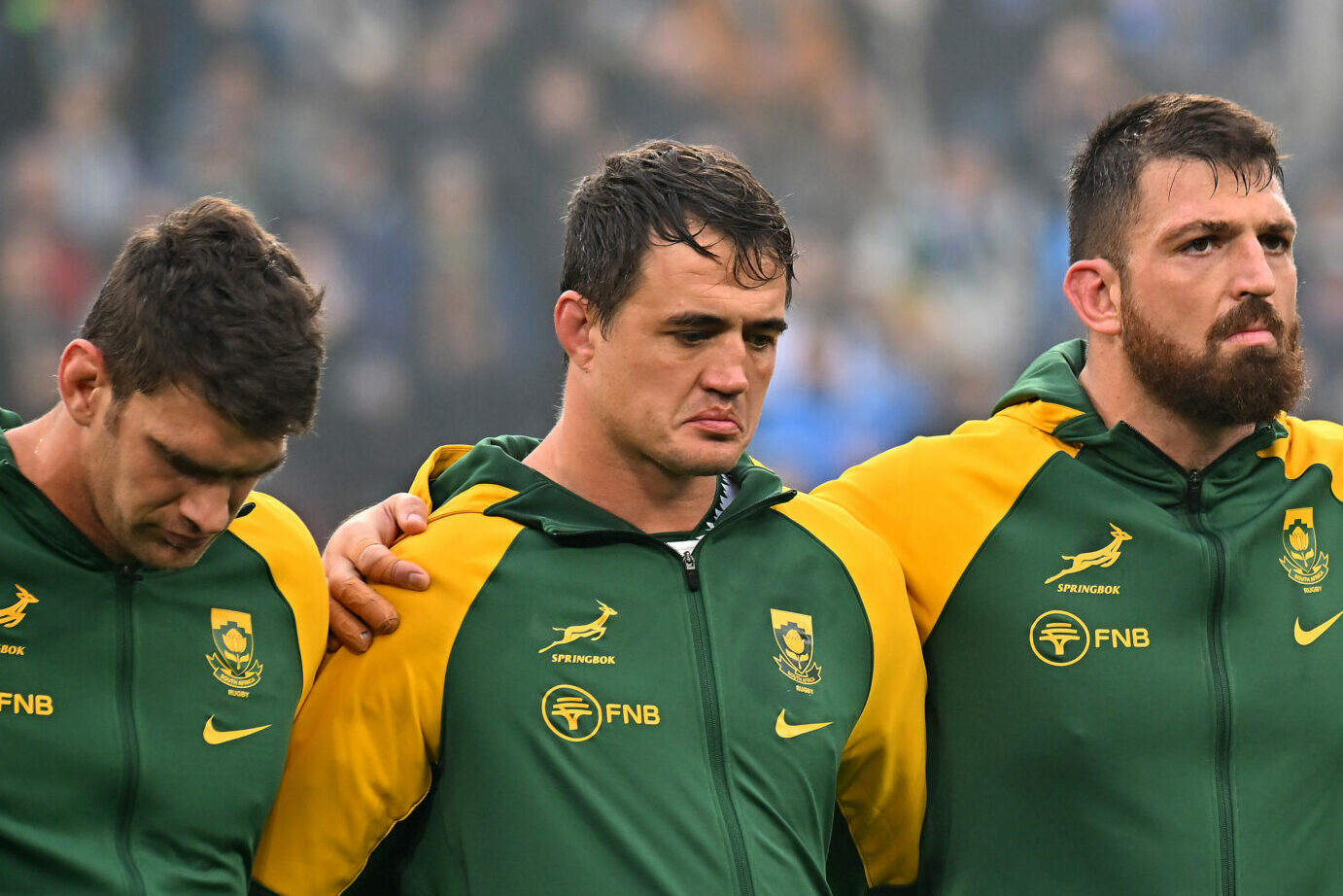
World Rugby has been ridiculed: From former Italian international lock Carlo del Fava to former All Blacks wing Jeff Wilson, to former England international Andy Goode, there has been ridicule at world rugby’s officials for the straight red card given to the Springboks lock Franco Mostert in Turin, Italy, writes Mark Keohane.
Mostert was shown a straight red card, as the second tackler, for what match officials deemed was an intentional shoulder to the head of Italian flyhalf Paolo Garbisi, who never went for an HIA and was up and running a few seconds after taking the tackle of Ethan Hooker and the secondary hit from Mostert.
Below is a collection of X feeds, which also showcased the inconsistency in all this weekend’s internationals when it came to shoulders to the head. In some instances, like James O’Connor taking one to the head in Dublin, it was play on. Others, like in Cardiff in Wales’s match against Japan, it was a yellow with a bunker referral to see if it was a red.
Same incidents, all different interpretations and applications.
World Rugby is a joke at the moment with its head contact policies that lack all consistency and all common sense.
If player welfare is indeed the reason, then why not send the victim of any head contact for an HIA?
Thomas Ramos, against the Boks last weekend, never went for an HIA and played the entire match. Garbisi never went for one in Turin and played the entire game.
It is a joke.
South Africans are justified in feeling aggrieved.
In my Sunday Times match review, I wrote that Justice, in the quality of the Springboks, triumphed over injustice, in the form of incompetent match officials, in Turin as the Springboks won for the 19th time in 20 Tests against Italy.
These Boks have a spirit that can’t be bought or manufactured. It is inherent because of an environment that has been nurtured over the past nine years.
Jared Wright posted this: Brilliant stat via @StatBoy_Steven
‘Since the introduction of the 20-minute red card, the Springboks have been given a full red card 3 times: July 12 vs Italy: Wiese in the 12th minute November 8 in France: Lood de Jager in the 40th minute November 15 in Italy: Franco Mostert in the 12th minute In 178 minutes combined in those matches after being shown the red card, they have conceded just 17 points and just 1 try, and won all 3.’
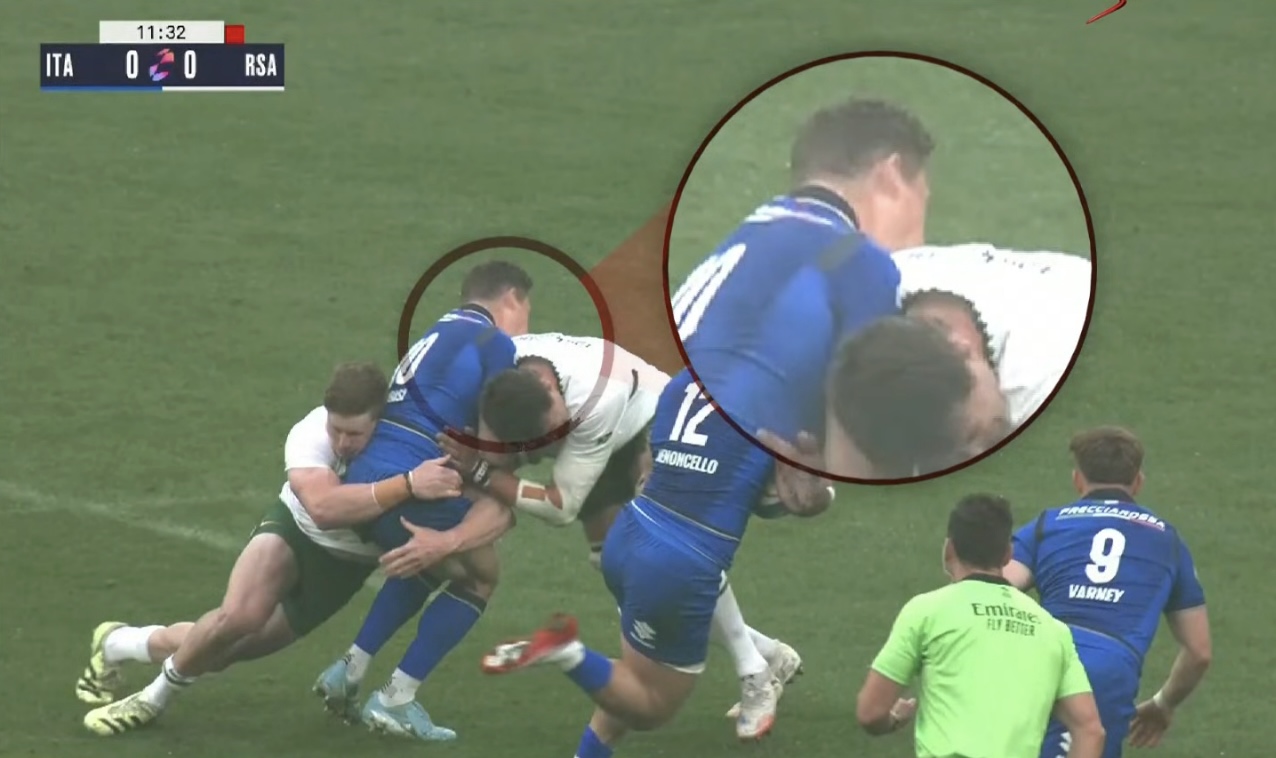
Screenshot
FRENCH V FIJI RED GOES UNPUNISHED
O’CONNOR GETTING SMASHED GOES UNPUNISHED
A COLLECTION OF INCONSISTENCIES FROM THE WEEKEND
WALES V JAPAN – ANOTHER INCONSISTENCY TO MOSTERT’S
WALES’S JOSH ADAMS INTENTIONAL THUGGERY GOES STRAIGHT TO BUNKER REVIEW
MARK KEOHANE ON BOKS 32-14 WIN v ITALY
Some X comments
https://x.com/AndyGoode10/status/1989727007467360333?s=20
https://x.com/PlanetRugby/status/1989701468635451731?s=20
https://x.com/SARugbymag/status/1990034224963854816?s=20
https://x.com/jaredwright17/status/1989700599630204977?s=20
https://x.com/SportyBetZA/status/1989747718961447247?s=20
https://x.com/SSRugby/status/1989681762075570494?s=20
https://x.com/mark_keohane/status/1989756004096168227?s=20
https://x.com/SSRugby/status/1989692773055041607?s=20
Photo: Alessandro Sabattini/Getty Images
International Rugby
It does not get bigger than the All Blacks in South Africa
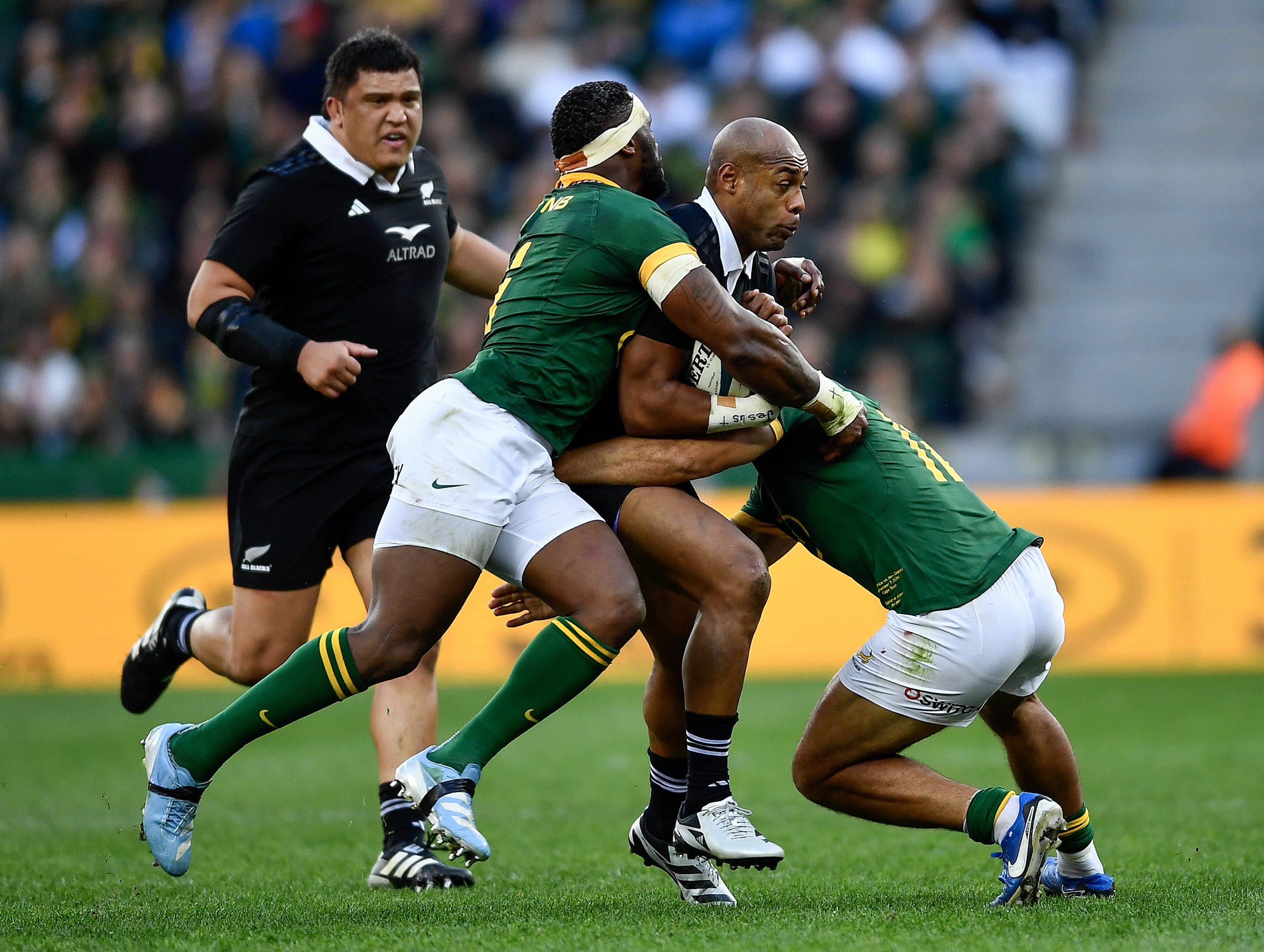
There is no greater rivalry in rugby than the All Blacks and Springboks, and it does not get bigger than the men in black touring South Africa, writes Mark Keohane. Finally it is official. Rugby’s worst kept secret is rugby’s best news for 2026.
The All Blacks will tour South Africa in 2026, play all four Vodacom United Rugby Championship teams and three Tests against the Boks, with a fourth to be played on a neutral venues, still to be announced but most likely in London.
The All Blacks have toured South Africa just six times and their only success, in a Test series, was 30 years ago, in 1996. It was the last time they toured.
Sean Fitzpatrick’s history makers won the first two Tests in Durban and Pretoria before losing the third Test at Ellis Park.
The 33-26 win in Pretoria is iconic, for the result, the quality of the match and the pedigree of the two teams.
SA Rugby’s Communications revealed all details on Thursday, 16th October.
Rugby’s Greatest Rivalry announced: Springboks and All Blacks reignite traditional tours
· Quadrennial tour between Springboks and All Blacks announced
· Eight match schedule of All Blacks’ 2026 tour of South Africa confirmed
· Historic fourth Test to be played internationally
· Springboks’ first professional era tour of New Zealand to occur in 2030
Rugby’s Greatest Rivalry, an alternating quadrennial tour between South Africa and New Zealand, was confirmed on Thursday, marking a defining new chapter for the intense rivalry between the sport’s most successful and storied nations.
In the tour’s maiden year, South Africa will host New Zealand in August and September 2026. The All Blacks kick off the tour against the DHL Stormers in Cape Town on Friday, 7 August and take on the Hollywoodbets Sharks, Vodacom Bulls and Lions, to complement a four Test series against the Springboks.
Ellis Park (Johannesburg), DHL Stadium (Cape Town), and FNB Stadium (Johannesburg) are confirmed as South African Test venues, preceding a landmark fourth Test hosted at a neutral international venue. Details of the fourth Test will be confirmed in the coming months.
By reigniting rugby’s traditional roots, the tour will renew the legacy of a rivalry known for its fierce competition and societal significance across the last century.
Next year marks 30 years since New Zealand’s last major tour of South Africa, where the visitors embarked on an eight-match schedule, culminating in a historic 2-1 Test series win. In the reciprocal 2030 iteration, South Africa will conduct their first professional era tour to New Zealand.
SA Rugby CEO Rian Oberholzer said: “This fierce competition between two very proud nations has delivered more than a century of drama on rugby fields across the world, including two Rugby World Cup finals.
“We saw last year how much it means for Springbok supporters to welcome the All Blacks to South Africa, and we can’t wait to see them tour our country next year, as we rekindle our friendship with our greatest adversaries.
“Today’s announcement promises more drama, physicality, strategy, and unpredictability in a rivalry regarded as one of the most intense in world sport.
“This tour will also mean so much for our four franchises and their players – facing one of the best teams in the history of the game – as well as their fans, who will have the opportunity to see their team in action against international opposition for the first time since 2009. We know next year’s tour will be nothing short of epic.”
Mark Robinson, CEO of New Zealand Rugby added: “The rivalry between the All Blacks and the Springboks is fierce, but it’s also steeped in history and respect. Rugby’s Greatest Rivalry is everything that is great about traditional rugby tours whilst finding new ways to offer more for fans to see and engage with. All eight matches during this tour will be a showcase of our sport for fans, whether they are in New Zealand, on the ground in South Africa, or across the globe.”
RASSIE RAVES ABOUT RIVALRY TOUR
Back-to-back Rugby World Cup winning Springbok captain Siya Kolisi said: “This is going to be something huge and something this generation will never forget. These are the tours we’ve only heard of. To experience this for the first time, where it’s like a Lions tour, is unbelievable for us as a group.
“I have no doubt the Springbok fans will be there waiting to welcome the All Blacks fans to South Africa. Let’s get excited; let’s get behind it and, people of South Africa, it’s an opportunity for us to show the world once again who we are and what we are about – we certainly can’t wait for it.”
All Blacks captain Scott Barrett said: “This is a huge rivalry, and one that is founded off mutual respect, but for 80 minutes these are two teams that every time they play there’s everything on the line. The intensity is right up there, and it is shaping up to be a heck of a tour. The format will be great, and there will be a whole lot of excited fans watching from home, and travelling with us as well. We are looking forward to it.”
Tickets for the tour, including match bundles, will go on general sale early next year. Fans can sign up to be the first to hear and gain priority access to pre-sales by visiting greatest-rivalry.com
The launch of Rugby’s Greatest Rivalry sees the creation of a new and bold visual identity for the tour. Its logo brings together the iconic Springbok and All Black marks inside a ‘V’ shape, putting them at the heart of the ‘versus’ terminology used when debating heavyweight international clashes. Its earthy colour palette takes inspiration from the tones from each nation’s landscapes.
Rugby’s Greatest Rivalry tour fixtures 2026
Friday 7 August: DHL Stormers v All Blacks at DHL Stadium, Cape Town
Tuesday 11 August: Hollywoodbets Sharks v All Blacks at Hollywoodbets Kings Park, Durban
Saturday 15 August: Vodacom Bulls v All Blacks at Loftus Versfeld, Pretoria
Saturday 22 August: First Test – Springboks v All Blacks at Ellis Park, Johannesburg
Tuesday 25 August: Lions v New Zealand at Ellis Park, Johannesburg
Saturday 29 August: Second Test – Springboks v New Zealand at DHL Stadium, Cape Town
Saturday 5 September: Third Test – Springboks v New Zealand at FNB Stadium, Johannesburg Saturday 12 September:
Fourth Test – South Africa v New Zealand (International venue to be announced)
*The tour replaces the 2026 Castle Rugby Championship, as does the 2030 Springboks tour to New Zealand, where the Boks will play three Tests and five matches against the Super Rugby franchises.
BOK BEFOK: Springboks 43 All Blacks 10
International Rugby
AfricaPicks & Keo dovetail in the name of rugby data
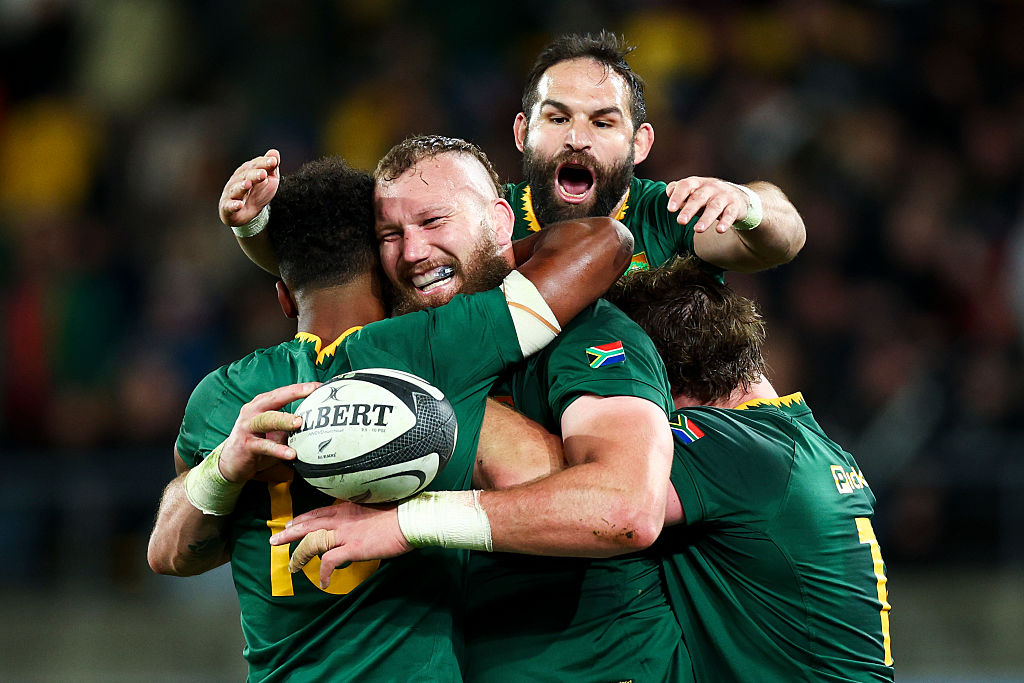
AfricaPicks will partner with Keo.co.za to bring data to life in the rugby landscape. The two platforms will combine in their coverage of all the major rugby matches.
Statistics aside, the biggest plus of Keo.co.za’s collaboration with AfricaPicks is the accessibility to data in the storytelling and an ability to give the rugby consumer an informed opinion, be it to retell the story or have a flutter on a match.
Sports betting is packaged with storytelling and the logical partnership was to give the African rugby fan the necessary information and breakdown of that information to make insightful choices, especially when betting on rugby matches.
‘The partnership will redefine the opinion, analysis and historical edge of the platform,” said Keo.co.za founder Mark Keohane.
Keo.co.za was launched in 2004 and is a legacy URL with a strong alignment to digital rugby giant SA Rugby Magazine.
Keohane has professionally reported on rugby in South Africa, Africa and across the world since South Africa’s international readmission in 1992.
“It is a new and exciting digital voice for rugby in the continent and the interest extends beyond South Africa, with the sport having a big following in Kenya, Namibia, Uganda and Zimbabwe,” said Keohane. “Zimbabwe’s qualification for the 2027 RWC in Australia has only added to the interest.”
Keo.co.za has long been South Africa’s home of unfiltered opinion and analysis and its founder and primary content creator (Keohane) said AfricaPicks content direction was an obvious fit for his platform.
“It is opinion-first, data-backed rugby journalism that speaks to the punters and thinkers, and not followers of perception. The content vision at AfricaPicks is about education and inspiration, giving the punter something beyond the obvious and being responsible,” said Keohane.
“I believe betting, like sport, is about perspective — and AfricaPicks delivers that in every story. It is a digital presence that will add to the ecosystem and bring together fans bettors and experts on one platform.”
AfricaPicks will focus on rugby in Africa and France’ Top 14, England’s Premiership, the Vodacom United Rugby Championship that features 16 teams, including South Africa’s quartet of the Bulls, Lions, Sharks and Stormers, as well as the Springboks and the national teams of Kenya, Namibia and Zimbabwe.
KEO News Wire
No team will ever replicate the All Blacks decade of dominance
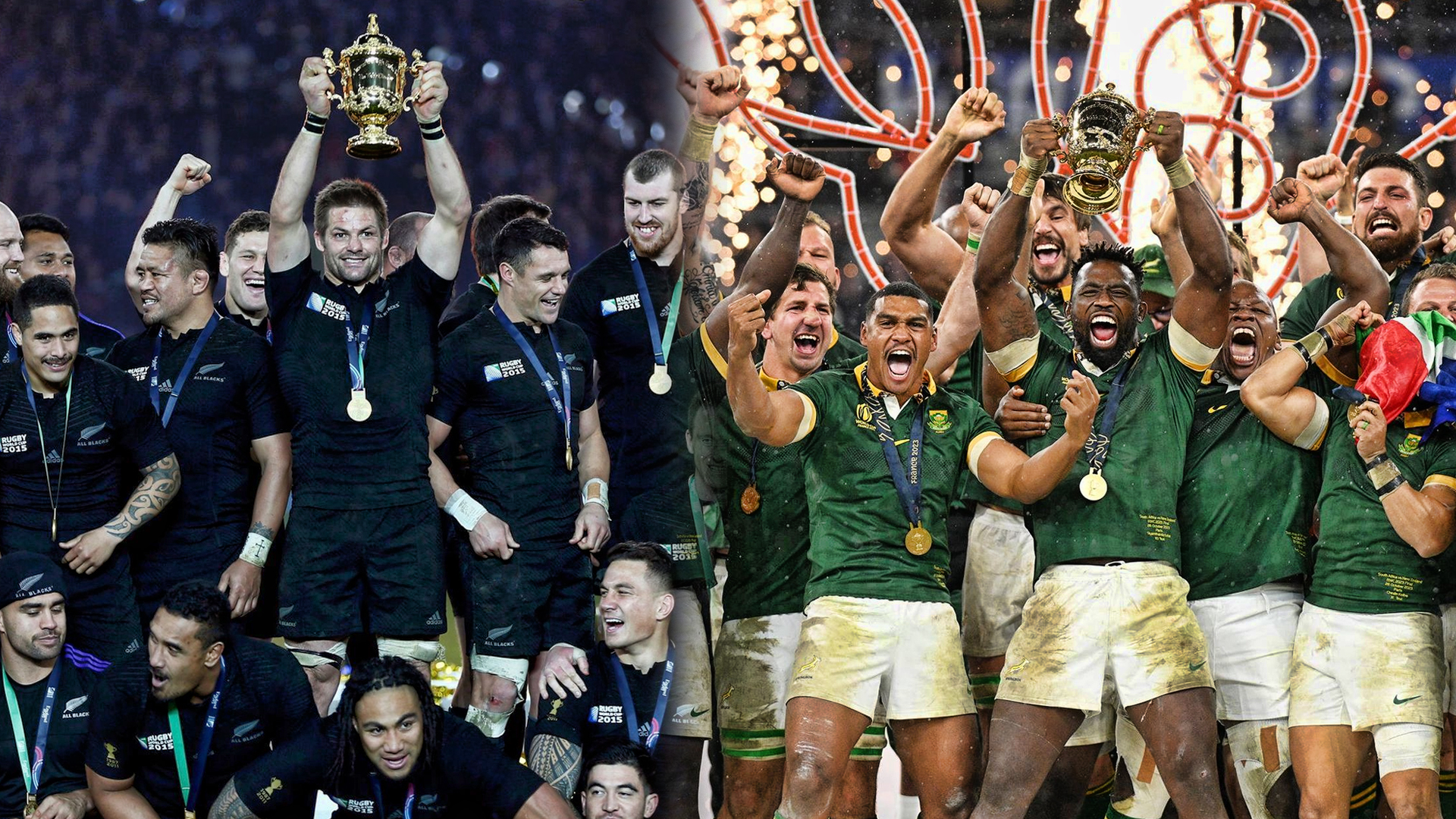
Rassie Erasmus’s rampant Springboks set the standard in Test rugby in 2025, but nothing will ever compare to the dominance of the All Blacks between 2009 and 2019, writes Mark Keohane, who doubts there will again ever be such an emphatic hold on the No 1 world ranking.
There is no debate. Erasmus, former Boks coach Jacques Nienaber and captain Siya Kolisi have led the Springboks to a Golden Era since winning the World Cup in 2019.
The squad, in a peak for some and in transition for others, has enjoyed their best returns in the past 36 months, with 31 Test wins from their last 37 internationals and a 54-7 win against the Barbarians in Cape Town to start the 2025 Test season.
Successive World Cup titles in 2019 and 2023, a British & Irish Lions series win in 2021, a Castle Rugby Championship title in 2019 and successive Rugby Championship titles in 2024 and 2025 have defined Kolisi’s current Kings of Rugby.
To illustrate just what Kolisi’s Boks have achieved, is to highlight that in the first 23 years of the Tri nations and Rugby Championship, the Boks won the title three times. In the past seven years, they have won it three times.
The 2025 title success was also the first time the Boks had gone back to back in the Rugby Championship, something the 1999 World Cup-winning Wallabies also achieved in 2000 and 2001.
But nothing compares to the All Blacks dominance in the Tri Nations and Rugby Championship, and the All Blacks, from 2009 to 2019 produced results that will never be matched. In that period they played 128 Tests, lost 12, drew four and won 112. In that period they won the World Cup twice, the Bledisloe Cup 11 successive years and won the Tri Nations/Rugby Championship seven times, including winning the Rugby Championship three times on the bounce from 2012, 2013 and 2014, before winning the 2015 World Cup, and then winning the Rugby Championship in 2016, 2017 and 2018.
The All Blacks have won the Tri Nations/Rugby Championship 20 times, the Springboks have six titles and the Wallabies have four. The Pumas have never won the title.
Erasmus, in celebrating the record-breaking Boks, was quick to emphasise that the celebration was about what South Africa was achieving. ‘We know New Zealand set the standard and did it many times.’
Erasmus, after winning the 2019 World Cup, challenged his Boks to find the consistency of the All Blacks from 2009 to 2019 in defining their own legacy. That meant winning 80-plus percent of the games all the time. In the last three seasons they have achieved this and Erasmus continues to challenge the players to chase that golden standard between 2009 and 2019.
All Blacks coach Scott Robertson has 17 wins from 23 since succeeding Ian Foster in 2024, which is a 73.9 percent win record; one that puts him in the top bracket of Test-winning coaches globally, but not among the elite of All Blacks coaches.
New Zealand’s success in consistently winning in the 2000s is a curse to the current crop, who lack the quality of their predecessors, but also are playing at a time when so little separates the top eight to 10 teams in the world rankings.
Erasmus, in his two tenures as head coach, has 35 wins from 48, which puts him at 72.9 percent. It makes him the most successful Boks coach of those who have coached more than 20 Tests.
His 72.9 percent win is substantially better than the Springboks historic win percentage in the Tri Nations/Rugby Championship, which is 47% – and Erasmus and Nienaber’s success since 2019 has improved that average.
The Boks have 69 wins from 147 matches for 333 league points over 30 years (46.9 %). The All Blacks have 107 wins from 149 matches for 521 league points in the same period (71.8%).
The All Blacks also lead the Freedom Cup battle against the Boks 16 to 4 over the last 20 Tri Nations/Rugby Championship tournaments.
There is absolute acknowledgement in New Zealand that the Boks are running hot and are the team to beat in 2025, but the numbers of those All Blacks from 2009 to 2019 were just insane.
In that period the All Blacks played the Boks 24 times and won 17 and drew once, with six of the wins coming in South Africa and two at neutral venues in the 2015 and 2019 RWC.
The AllBlacks home page details some of the staggering numbers of that decade
12: The record for the most consecutive away wins began with a 42-8 victory over Australia on August 20, 2016, in Sydney and ended with an 18-23 loss to Australia in Brisbane on October 20, 2017.
14: In 2013, the All Blacks became the first team in the professional era to win every Test match in a 14-Test calendar year.
18: The All Blacks set a world record by winning 18 consecutive Tier I Test matches from August 15, 2015, to November 5, 2016. This remarkable streak began with a 41-13 victory over Australia at Eden Park and concluded with a 29-40 loss to Ireland in Chicago. England matched this tally between 2015 and 2017.
93: The most wins by a single head coach was achieved by Sir Steve Hansen in 107 Tests between 2011 and 2019. Sir Graham Henry won 88 of 103 Tests between 2004 and 2011. Hansen was an assistant coach for that entire span.
Henry and Hansen combined as head coaches to win 181 Tests in 210 between 2004 and 2019 = 86%
743: World Rugby introduced official weekly world rankings just before the 2003 Rugby World Cup. The All Blacks have held the top position for an unrivalled 743 weeks with eight tenures at one. South Africa is the next-best team with 278 weeks at the top. From November 16, 2009, to August 19, 2019, the All Blacks maintained their number one ranking for 509 consecutive weeks. During this period, they played 128 Tests, achieving 112 wins, 12 losses, and 4 draws. Additionally, from June 14, 2004, to October 22, 2007, the All Blacks played 47 games while ranked as the world number one, winning 41 of those matches.
It could explain why 17 wins in 23 from All Blacks coach Robertson jars with the New Zealand rugby public because the reality is the Springboks and All Blacks both finished the 2025 Rugby Championship with fours wins from six and on 19 league points.
And we are in state of ecstasy and the Kiwis are in mourning.
INCOMPARABLE PIETER-STEPH DU TOIT INSPIRES THE BOKS
KEO News Wire
Toyota Hilux Legend 55 speaks to the rugby legacy of Bakkies Botha
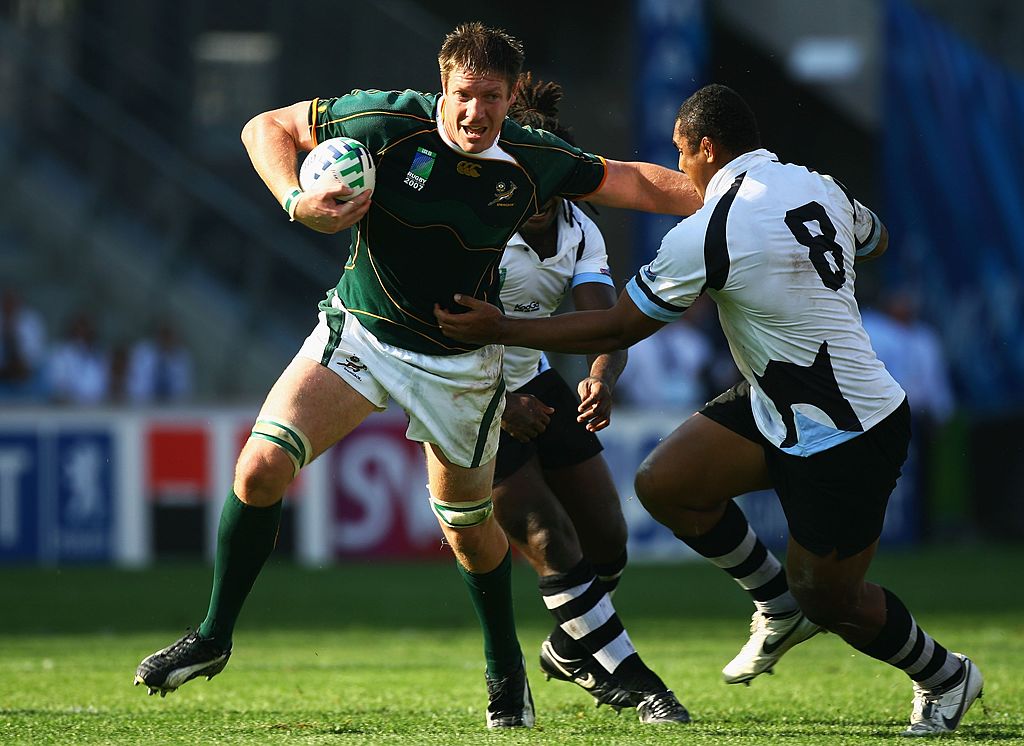
John Philip Botha is as close as one can get to the Toyota Hilux Legend 55, writes Mark Keohane.
The Hilux Legend 55 is sold as being more than a Bakkie, but in terms of rugby players, it matches the ultimate in one Bakkies Botha.
The Keo & Zels Show partnered with Toyota to showcase the Legend 55 and dedicate a four-part series to four Bok legends Zels and I believe to speak the language of the Legend 55.
Our selection policy was that we could not include a current Springbok but had to dig into the archives to define legacy and legend as qualities.
Our gifted quartet is Bakkies Botha, Danie Rossouw, Schalk Burger and Frans Steyn.
In the first of the four-part series we celebrate the achievements of Bakkies Botha as a Springboks and professional rugby player, who won every rugby title possible when he played in the Southern Hemisphere for the Bulls and in the Northern Hemisphere when he played for the French club Toulon.
Botha, who played 100 matches for the Bulls in Super Rugby and won the premier southern hemisphere club title three times, was part of the exceptional Toulon squad that won three successive Investec Champions Cup titles, then known as the Heineken Cup.
Botha also won France club rugby’s coveted Top 14 title, as well as the Currie Cup in South Africa.
He won the 2007 World Cup with the Springboks, a 15-6 win against England in Paris, France, and was also a Tri nations title winner.
Botha was the fans’ vote for the greatest ever No 4 lock in the 30 year history of Investec Champions Cup and the former French national coach and Toulon Director of Rugby Bernard Laporte described Botha as the best player he had coached.
Botha told me it was among his greatest compliments. Equally each time one of his peers selected him in their finest World XVs.
Botha’s durability, sustainability, longevity, excellence and reward in titles.
Blue Bulls
- Vodacom Cup: 2001
- Currie Cup: 2002, 2004, 2006 (draw), 2009
Bulls
- Super Rugby: 2007, 2009, 2010
Toulon
- Heineken Cup European Champions/European Rugby Champions Cup: 2013, 2014, 2015
- Top 14 French League : 2014
South Africa
- World Cup: 2007
- Tri-Nations: 2004, 2009
- British & Irish Lions series win: 2009
- Mandela Challenge Plate: (v Wallabies) 2005, 2009
- Freedom Cup: (v All Blacks) 2004, 2009
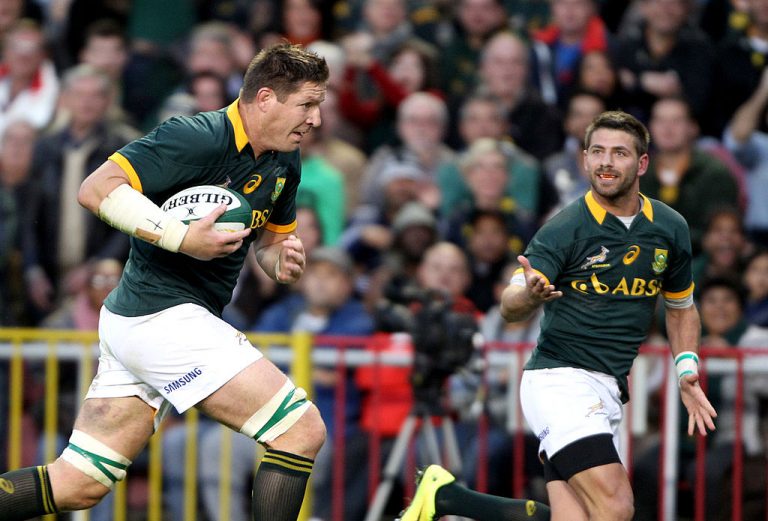
CAPE TOWN, SOUTH AFRICA – JUNE 07: Bakkies Botha of the Springbok in action during the International match between South Africa and World XV at DHL Newlands Stadium on June 07, 2014 in Cape Town, South Africa. (Photo by Carl Fourie/Gallo Images/Getty Images)
In a new series, we celebrate the new Toyota Hilux Legend 55, and a select quartet of Bok rugby legends of similar ilk!@ToyotaSA #Legend55 #ToyotaBakkiesSA #NotJustABakkie pic.twitter.com/y17evMCfQe
— SA Rugby magazine (@SARugbymag) October 3, 2025
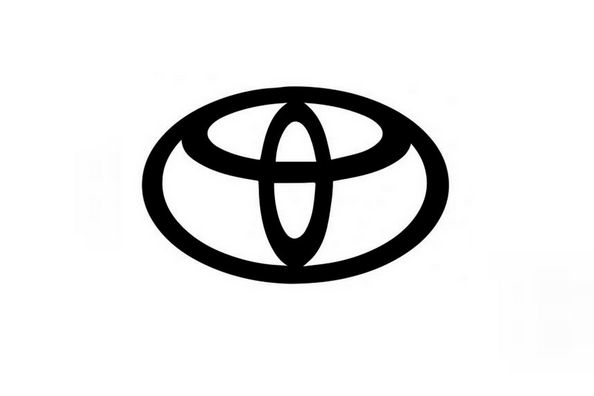

International Rugby
Rassie backs young Bok guns to fire the shots at Twickenham
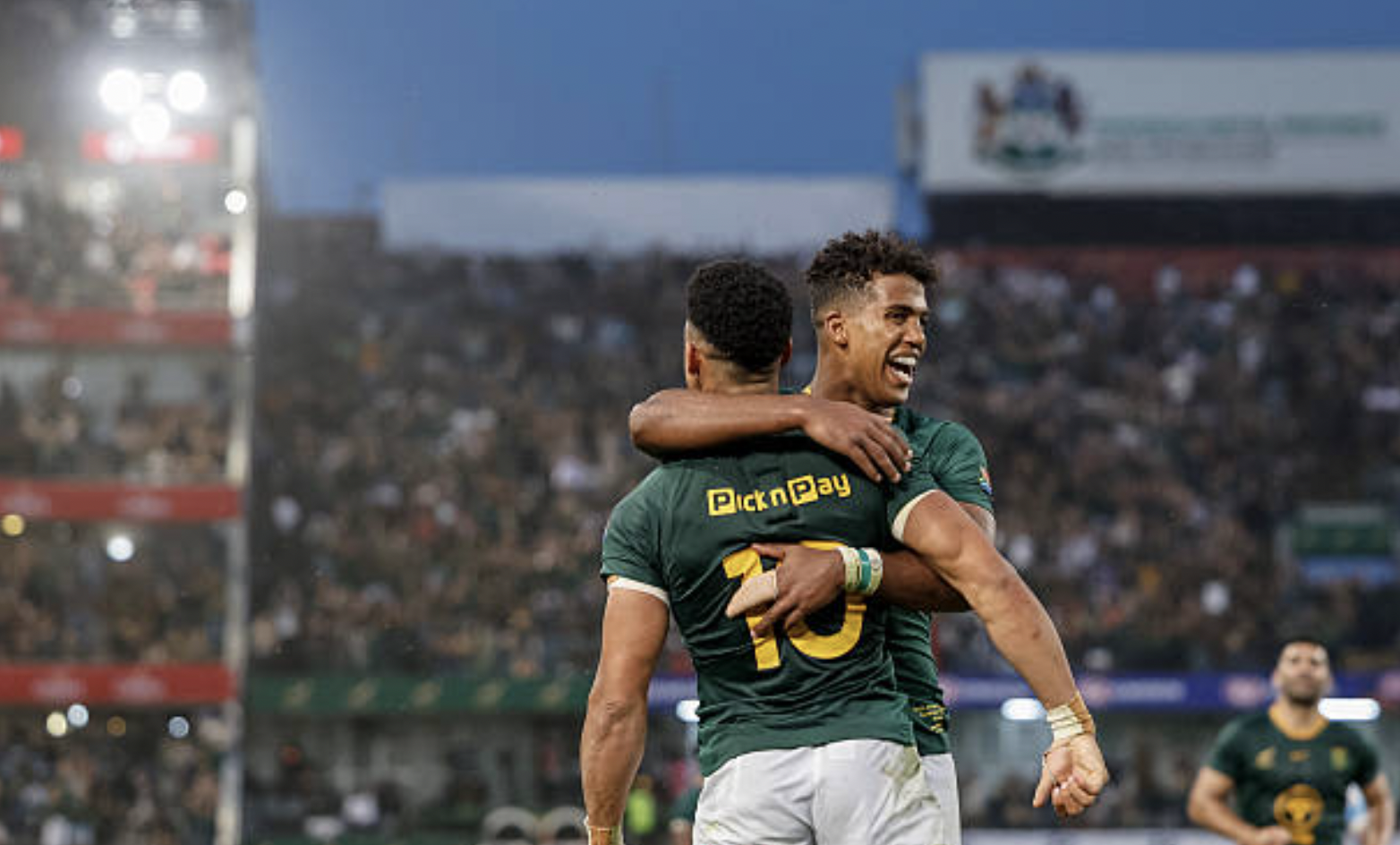
Springboks coach Rassie Erasmus has backed the young Bok guns to do the business at Twickenham agains the Pumas. It is not so much discarding the old guard but recognising the form of the Boks next generation, writes Mark Keohane.
It is also not putting out to pasture those who won the Castle Rugby Championship agains the Pumas in 2024.
To illustrate how Erasmus has evolved the squad in a Test season, without sacrificing results, he has named just eight from the starting XV who beat the Pumas to win the Castle Rugby Championship a year ago.
In the match 23, there are 15 from 23 in between two potential Rugby Championship titles, to also show how much squad continuity there has been. The differentiator, within the squad, is that there are eight survivors in the starting XV in between two matches that double as finals agains the same opposition.
I expected injury withdrawals, but that did not happen to Damian Willemse, Cheslin Kolbe or Ox Nche,
I anticipated changes, the likes of Handre Pollard and Jesse Kriel in the starting XV, or on the bench.
Pollard, the back to back World Cup winner, misses out from the match 23 for a third successive match and Kriel, captain of the Boks agains the All Blacks at Eden Park, gets a place on the bench for Andre Esterhuizen as Erasmus, for the second successive Test, went with those who have scored 15 tries and 110 points in their last two Castle Rugby Championship wins.
Erasmus, who pre the Wellington Test win was averaging 12 changes in his match 23 and eight in his starting XV , has rewarded form, and the finishing brilliance of a squad who put the All Blacks to the sword 43-10 in New Zealand, and backed that up with a 67-30 win agains the Pumas in Durban.
The Boks win, they win the title.
Boks beat Pumas 48-7 in Nelspruit to win Castle Rugby Championship in 2024.
Springboks
Starters: Fassi, Kolbe, Kriel, De Allende, Arendse; Libbok, Hendrikse; Nche, Mbonambi, Malherbe, Etzebeth, Nortje, Kolisi (capt), Du Toit, Wiese. Finishers: Marx, Steenekamp, Koch, Louw, Smith, Reinach, Pollard, Am.
Springboks (to play for the Castle Rugby Championship title v Pumas at Twickenham in 2025)
Starters: 15 Damian Willemse, 14 Cheslin Kolbe, 13 Canan Moodie, 12 Damian de Allende, 11 Ethan Hooker, 10 Sacha Feinberg-Mngomezulu, 9 Cobus Reinach, 8 Jasper Wiese, 7 Pieter-Steph du Toit, 6 Siya Kolisi (captain), 5 Ruan Nortje, 4 Eben Etzebeth, 3 Thomas du Toit, 2 Malcolm Marx, 1 Ox Nche. Finishers: 16 Bongi Mbonambi, 17 Jan-Hendrik Wessels, 18 Wilco Louw, 19 RG Snyman, 20 Kwagga Smith, 21 Grant Williams, 22 Manie Libbok, 23 Jesse Kriel.
International Rugby
Loud and clear – Sacha FM turns up the volume for the Boks
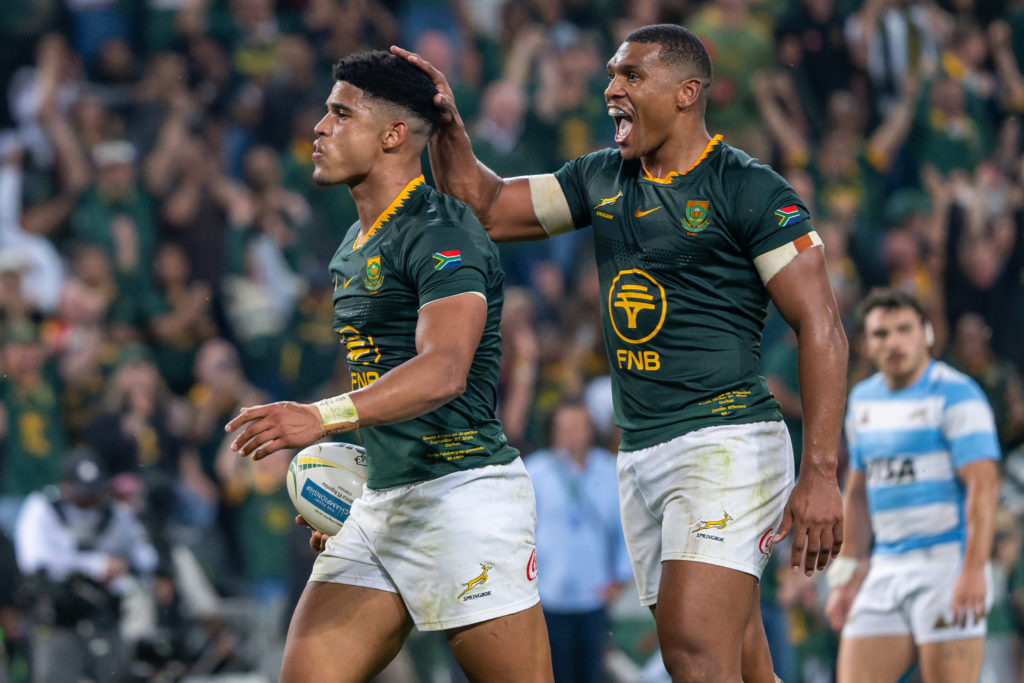
Sacha Feinberg-Mngomezulu is South Africa’s new sound at 10, writes Mark Keohane
This is the feature article I wrote for SA Rugby Magazine’s digital and print publication two months ago, 60 days before Feinberg-Mngomezulu rewrote the history books of Springbok rugby and scored a record 37 points against the Pumas in Durban on Saturday night.
No hindsight was needed or confirmation of his ability. It was always there.
There’s a new frequency crackling through South African rugby. It is clear, confident and controlled. It’s not static. It’s not noise. It’s Sacha FM – and it’s about to go global.
You don’t watch Sacha Feinberg-Mngomezulu play rugby. You tune into him.
And when you’re locked into the Sacha FM station, it’s all rhythm and no distortion. He plays the game like he was born with a boot made of silk and a brain made of sonar.
In 2025, there is no signal louder than Sacha FM.
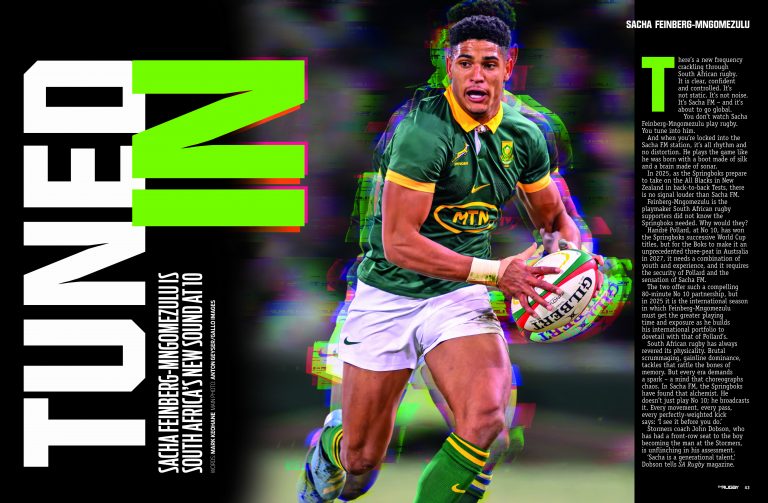
Feinberg-Mngomezulu is the playmaker South African rugby supporters did not know the Springboks needed. Why would they?
Handré Pollard, at No 10, has won the Springboks successive World Cup titles, but for the Boks to make it an unprecedented three-peat in Australia in 2027, it needs a combination of youth and experience, and it requires the security of Pollard and the sensation of Sacha FM.
South African rugby has always revered its physicality. Brutal scrummaging, gainline dominance, tackles that rattle the bones of memory. But every era demands a spark – a mind that choreographs chaos. In Sacha FM, the Springboks have found that alchemist. He doesn’t just play No 10; he broadcasts it. Every movement, every pass, every perfectly-weighted kick says: ‘I see it before you do.’
Stormers coach John Dobson, who has had a front-row seat to the boy becoming the man at the Stormers, is unflinching in his assessment.
‘Sacha is a generational talent,’ Dobson told me. ‘We knew from the moment he came through that he wasn’t normal. He doesn’t think about the game like others. He feels it. His rugby IQ is scary. He’s not going to be great – he already is.’
Dobson’s right. Sacha didn’t arrive. He interrupted.
Sacha FM: Springbok rugby’s Anointed One
From captaining SA Schools at just 18, to leading the U20 side, his rise has never been subtle. And yet, even with those lofty accolades, no one could have predicted the authority with which he would take to Test rugby.
In 2024, he made his debut off the bench against Wales. But it was what followed in the Rugby Championship that confirmed the rugby reality of Feinberg-Mngomezulu was as seductive as any fantasy game.
Rewind to the All Blacks at Ellis Park in Johannesburg in 2024.
A full house. Altitude and pressure. But from the outset Sacha FM was on another frequency.
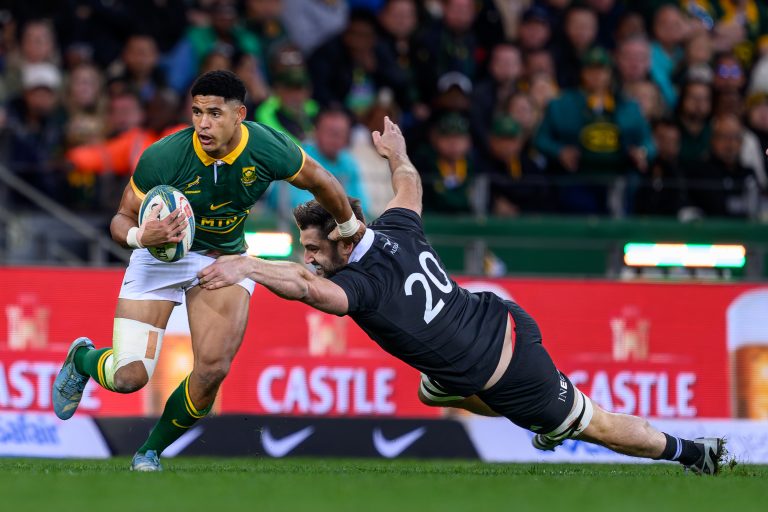
Photo: Anton Geyser/Gallo Images
He ran the game with the calm of a surgeon and the unpredictability of a poet. There was enthusiasm from the home crowd and envy from those wearing black. He played as if he had done it 20 times against the All Blacks.
The Boks, 27-17 behind with 10 minutes to go, won 31-27. Feinberg-Mngomezulu even had the luxury of a missed penalty kick with a few minutes to go.
The Boks won and the rugby world took notice, as they did in Australia the month before New Zealand arrived in South Africa. Feinberg-Mngomezulu started at No 10 in Brisbane and Perth and the Boks won both Tests, with the first Test win at Suncorp Stadium since 2013 a Sacha FM special.
‘We threw him into the deep end,’ said Rassie Erasmus after the Brisbane win in 2024, ‘but what I love about Sacha is he swims like he was born in the ocean. He’s got that calm. He’s got that belief. And technically – he’s world class already. He knows there are areas of his game and game management that must get better, but they will get better the more he plays Test rugby.’
Pollard, the double World Cup-winning general, remains a titan. But in Sacha FM, the Boks now have a foil; not a replacement. It’s not about either-or. It’s about the mix. The radio signal blends into stereo.
Pollard brings the grunt, the ice and the muscle-memory of winning World Cup finals. Sacha FM brings the jazz and the flavour and, with it, the ability to crack a game open in a moment. The Boks don’t just have a flyhalf. They have a broadcasting duo – static-free and perfectly in tune.
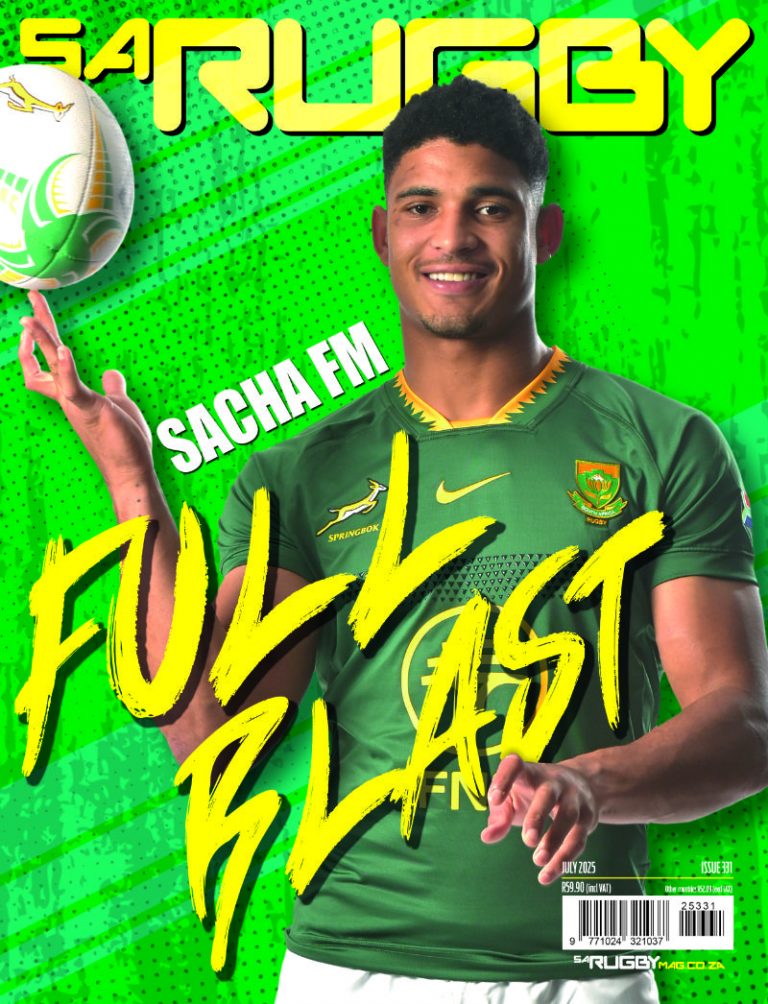
Pollard, in his third and final season for Leicester, was the model professional in his 55 matches. The club finished second in the league stage of the English Premiership and narrowly lost the final against Bath at Twickenham.
Feinberg-Mngomezulu was as effective at flyhalf for the Stormers in 2025, although his style has been in complete contrast to that of Pollard.
Two different leagues, in the Premiership and URC, but also two very different players in the No 10 jersey. The Springboks are fortunate to have both options. And Manie Libbok to complete world rugby’s most gifted trio of Test no 10 options.
Add Damian Willemse and there are four who could play Test rugby for the Boks. At a push, add Cheslin Kolbe and you have an unprecedented quintet of No 10 variations.
Sacha FM was the standout performer in the Stormers’ league comeback in the 2024/25 season to finish fifth, having earlier in the campaign languished 13th from 16 teams.
His individual reward was winning the South African URC Player of the Year award.
There was the 25-minute masterclass against Connacht that brought him three tries and his try-assist passes and cross kicks in the season were equally breathtaking. In Durban, on Saturday night, wearing Green and Gold, he produced a similar stunning hat-trick.
It was his vision and fearlessness that started Deon Fourie’s try, a 60m counter-attack effort against the Scarlets, that began with an outrageous reverse pass. The try won the league’s Try of the Season.
‘I trust my instincts,’ Sacha told the media after receiving his award. ‘Since I was a kid, I’ve always believed the game talks to you – if you listen. I’ve just tried to stay tuned in.’
To borrow from Stormers coach Dobson: You can’t coach that. You can’t teach feel. You either have that radio-active awareness, or you don’t. And Sacha FM does.
On Saturday night, two minutes after the win, the record breaker spoke with a calm of a player who had not scored a point.
‘We wanted to produce a performance like this. It was a great way to finish our home season,’ he said in the most understated manner.
Feinberg-Mngomezulu’s media persona is as blended in charisma as his on-field play. He is unfazed and when asked about the step up to Test rugby, he brought it back to the game staying the same.
‘It’s fast, yes. Physical, yes. But honestly? It’s just rugby. And I love rugby. I’ve been dreaming this dream for so long that it doesn’t feel overwhelming. It feels like home.’
That’s not arrogance. That’s alignment. A player who understands who he is, where he is and what he brings.
Feinberg-Mngomezulu’s attitude reminds me of a quote when former Manchester United forward Dwight Yorke was asked how he handled the pressure of playing in front of millions.Yorke’s response that a war-torn zone was pressure; playing soccer was pure joy.
Sacha FM is that player.
He’s the new voice of creativity in a Springbok system built on brutality. He doesn’t replace the blueprint. He adds to it. He enhances it and sharpens the edges and brightens the colours.
If 2024 was his Test introduction, then 2025 is his syndication.
Sacha FM, coming in loud and clear. From Cape Town to Cardiff. From Loftus to Twickenham and finally to Auckland, Wellington, Paris, Dublin and in record-breaking form, Durban.
He’s not just on frequency. He is the frequency.
KEO News Wire
Sacha FM: Springbok rugby’s Anointed One

Sacha FM can become rugby royalty. I’ve watched and reported on the careers of every Test flyhalf since the Springboks returned to international rugby in 1992, and Sacha Feinberg‑Mngomezulu is super special, writes Mark Keohane.
The rugby globe is rightfully raving about Feinberg-Mngomezulu’s Springboks record-breaking 37 points in the 67-30 Castle Rugby Championship win against the Pumas in Durban on Saturday, but those of us who have followed his career from a teenager at Bishops, in the southern suburbs of Cape Town, have always believed nights like Durban (for the Springboks) would not be long in waiting.
I’ve written on every professional Test rugby No 10 since the sport turned professional 1996.
I’ve travelled the globe and sat in stadiums from Pretoria to Paris and Perth, from Buenos Aires to Brisbane, from Cardiff to Christchurch and Cape Town, Mendoza to Melbourne, Wellington’ Sky Stadium to Sydney and Springs, from Houston to Hamilton, from Wembley to Twickenham, from Murrayfield to Montpellier and Marseilles, from Genoa to Bloemfontein, from Johannesburg to Auckland, and to the Nelson Mandela Stadium whenever I could get there for the Boks.
And from Dunedin to Durban.
I have been blessed to be there to write about Test rugby.
The occasions have been electric and the memories mind-blowing.
Think Jannie de Beer’s five drop goals in Paris against England in the 1999 Rugby World Cup quarter-finals, to Jonny Wilkinson’s 27 points in Bloemfontein against the Boks, to Morne Steyn’s 31 points against the All Blacks in Durban, to Carter’s 33 points against the Lions in Wellington, to Beauden Barrett’s 31 points against the Wallabies at Eden Park, to Sacha’s 37 points against the Pumas in Durban.
If there’s one position that defines a generation of rugby watchers, it’s the No 10 jersey.
England’s Wilkinson remains an icon. His 2003 World Cup‑winning wrong‑footed drop goal has been replayed a thousand times, but it was his obsession with preparation and his defensive steel that made him special.
Morné Steyn had that same ice‑cold temperament for the Springboks, as does Handre Pollard with two World Cup gold medals and a 100‑plus Test record still unfolding. Steyn scored 31 points in a Test against the All Blacks and beat the British & Irish Lions to secure the Springboks the Test series in 2009 in Pretoria and 2021 in Cape Town.
Jannie de Beer kicked five drop goals and scored 34 points against England in the 1999 World Cup quarter‑final in Paris, and André Pretorius kicked four drop goals against England at Twickenham and an angled penalty to beat the All Blacks in the final minute at Rustenburg. It all happened in 2006.
Then there is the 1995 World Cup‑winning drop‑goal master Joel Stransky, who a year later scored all 25 points in the Boks’ win against the Wallabies in Bloemfontein; Butch James, wearing No 10 with such authority in the World Cup‑winning final against England in Paris in 2007; and one of my early favourites, Henry Honiball.
New Zealand’s Andrew Mehrtens had touch and timing that few matched. Australia’s Stephen Larkham was the flyhalf who redefined instinctive play without ever saying much. And he kicked the most famous drop goal in Wallabies World Cup history, against the Springboks in the 1999 semi‑final at Twickenham.
All Blacks No 10 Carlos Spencer was a magician – a player who defied convention for the sake of joy.
England’s Owen Farrell is a Sir. Give him a knighthood. He’s a warrior, a leader and a metronome in the big moments.
Ireland’s Johnny Sexton and Ronan O’Gara put Ireland at Test rugby’s top table.
Stephen Larkham was wonderful for the Wallabies and Scotland’s Gregor Townsend was unorthodox and a genius before it was trendy. Finn Russell today is the closest we’ve come to reviving that free‑thinking flyhalf spirit.
Gareth Anscombe’s touchline conversion in 2022, to beat the Boks for the first time ever in South Africa, wrote his name into Welsh rugby folklore. Dan Biggar, with 115 Tests, gave Wales backbone and bite. Stephen Jones was as influential for Wales.
France’s flyhalves have always delivered flair and enterprise. Frédéric Michalak was all theatre, and Romain Ntamack is a combination of flash and function.
All Blacks Beauden Barrett, Aaron Cruden and Richie Mo’unga are all world‑class flyhalves. Barrett, at his peak, was untouchable on the run. Cruden had vision, calm and the most underrated presence in Test rugby. Mo’unga is a wonderful all‑round Test No 10.
Their All Blacks predecessor Dan Carter is the most complete flyhalf I have ever seen in the professional era
Carter played the game as if he was never in a hurry. The pass, the kick, the run – always in sync. He could play 10 or 12. He could tackle like a loose forward. And he did it all with the poise of someone who looked immune to the pressure and pain of Test rugby.
Carter owns the record for most Test points scored (1 598), but his goal kicking was a given. What completed him was every aspect of his game.
When people ask who the best is that I have seen – the best of the best – I don’t hesitate: Dan Carter.
Sacha Feinberg‑Mngomezulu is Carter‑like. Don’t read this as me thinking he is a Carter impersonator; rather, he has every quality that Carter showed in a 112‑Test career, in which he won 99 matches, drew one and lost 12.
Carter’s 33 points from 48 for the All Blacks against the British & Irish Lions in Wellington in 2005 was the most complete No 10 performance I had ever experienced, but 20 years later we have Feinberg-Mngomezulu’s 37-point individual effort in Durban to sit alongside that of what Carter produced in 2005.
Both did it as 23 year-olds. Carter did it in his 3rd season of Test rugby. Feinberg-Mngomezulu did it in his second season.
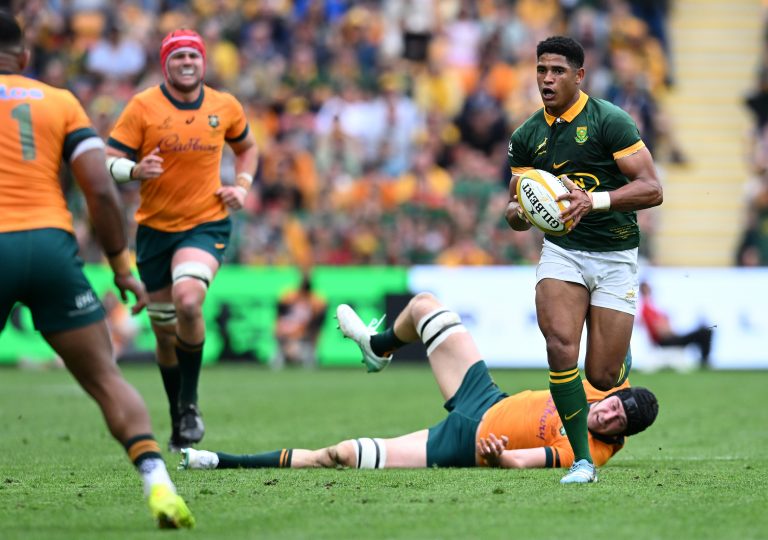
That is the potential of Feinberg‑Mngomezulu. That is why the hype is justified, even if the coronation is premature until his career is completed.
Carter won two World Cups and got to 112 Tests in a 15‑year Test career. He won everything there was to win, at every level. He wrote his own coronation at Twickenham in the 2015 World Cup final win against Australia.
Feinberg‑Mngomezulu is into his second year of Test rugby. He has been anointed, but the royal capping will only come with his last act in Test rugby.
For now, for pure pleasure and spectator joy, let’s celebrate the record-breaking 37 point nights Sacha FM produced in Durban against the Pumas because history has shown us how rare nights like those are for even the very best in the game.
SACHA SIZZLES FOR BOKS V WALLABIES IN BRISBANE
LOUD & CLEAR: SACHA FM TURNS UP THE VOLUME FOR THE BOKS


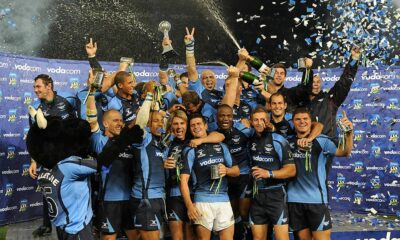

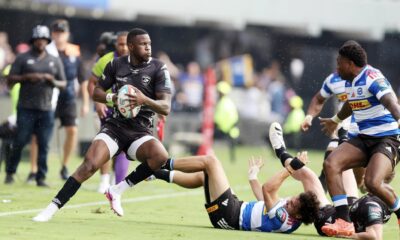

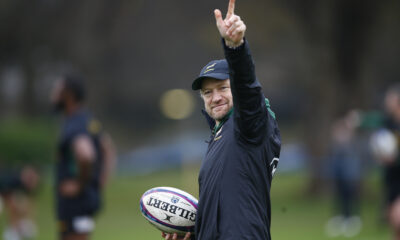

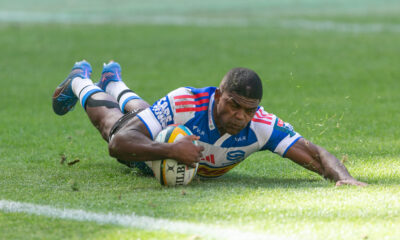

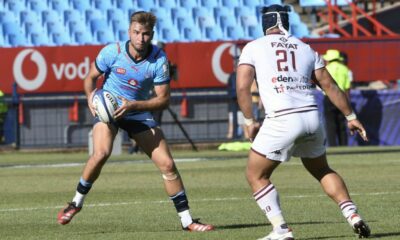



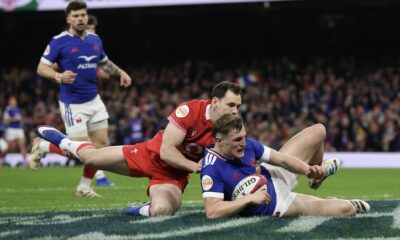

Pingback: No racism yet no conclusions in Ashwin Willemse discussions says Multichoice CEO - KEO.co.za